Edition 30
Please donate £1 to support your parish
See below for details


Good results from new programme to encourage teachers to become Catholic
page 3


Seventh trip to Ukraine for Archdiocese of Liverpool
page 6
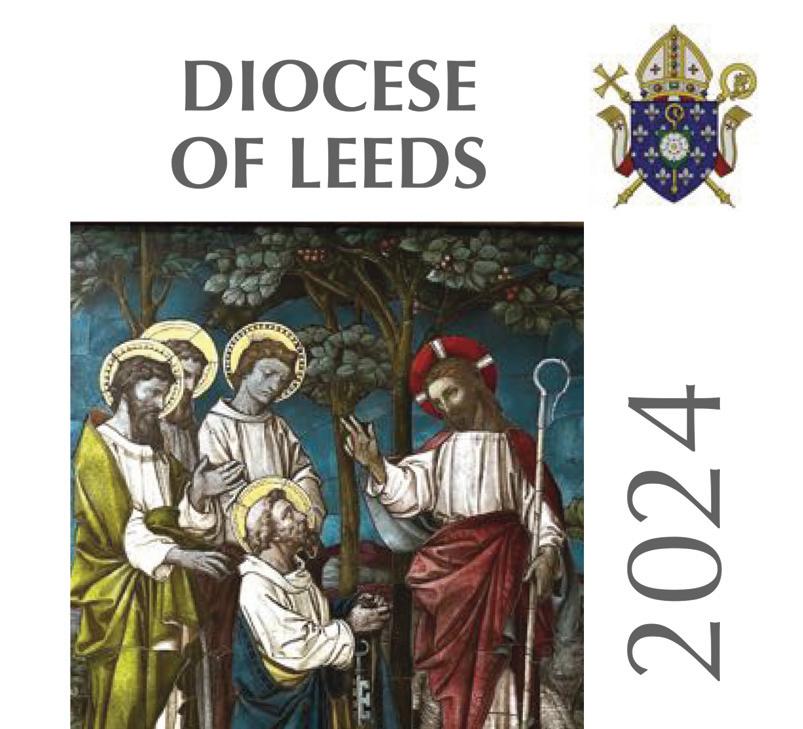
Nearly a century of Yearbooks shine a light on changes in society and the Church
page 8
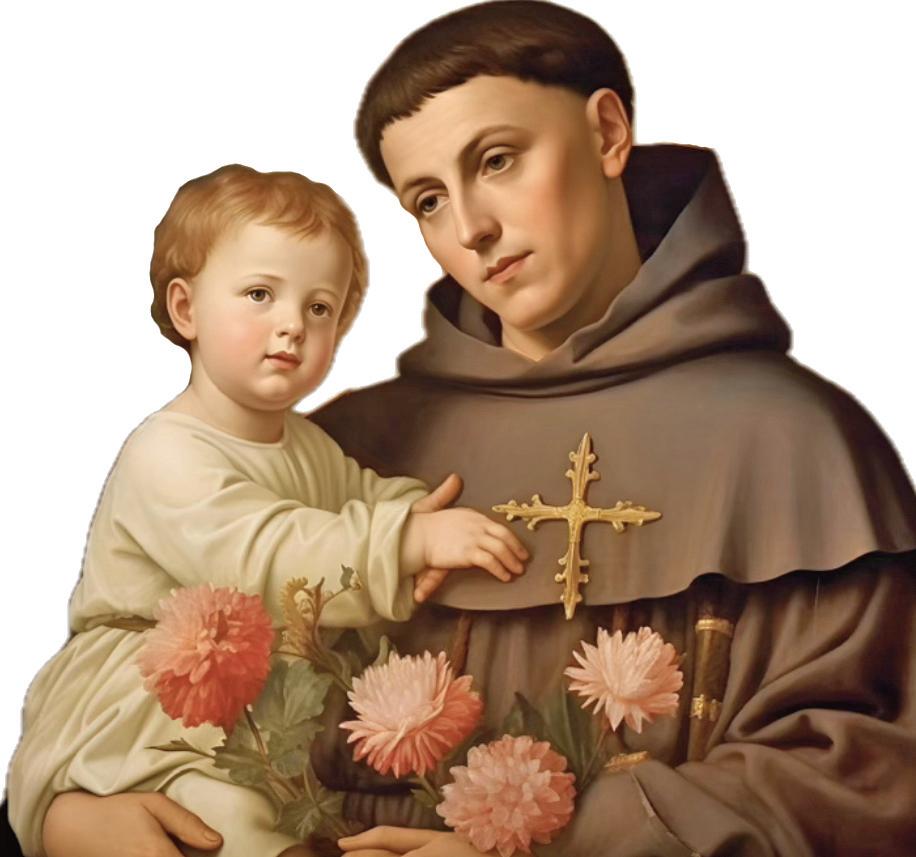

New Bishop Ordained at Clifton Cathedral
Bishop Bosco MacDonald was Ordained the Tenth Bishop of Clifton at Clifton Cathedral on Wednesday 7 May 2024.
A packed Cathedral welcomed the new Bishop, along with his family and almost all the Clifton diocesan priests and Deacons, and Bishops from England and Wales. The choir and music were outstanding.
Archbishop Bernard Longley, Archbishop of Birmingham and Metropolitan Principal was the Consecrating Bishop, with Bishop Declan and Bishop Peter Colins, Bishop of East Anglia, as Co-consecrating Bishops.
Along with representatives from Rome including the Apostolic Nuncio, the following message from Pope Francis was read:
From Pope Francis: Francis, Bishop, Servant of the Servants of God, sends greetings and a Blessing to his dear son Bosco MacDonald of the clergy of Clifton diocese and hitherto appointed to the Bishop of Clifton as dean and administrator of the Cathedral church of Saints Peter and Paul in the city of Bristol.
Blessed indeed was that Apostle who, proclaiming true witness to Christ the son of the living God, received at that moment his heavenly reward (cf Mt 16, 16-17). As We reflect today, stepping ahead joyfully, on so great a fatherly revelation, which is a support and consolation in Our task of guiding the universal Church, We now intend with fatherly concern to secure the welfare of the Clifton ecclesial

community which, deprived at present following the resignation of Our Venerable brother Declan Ronan Lang, awaits its Pastor.
We therefore consider that it is appropriate for Us to approach you, dear son, who, devoted as you are to pastoral activities, have displayed many human and christian gifts, by reason of which you seem to Us suited to this ministry. Accordingly, guided by the counsel of the Dicastery for Bishops and by the fullness of Our Apostolic authority, We willingly appoint you Bishop of Clifton, granting you the due rights and matching obligations associated with this ministry.
You may commit yourself to episcopal Ordination outside the City of Rome, maintaining liturgical norms, by a catholic Bishop of your choice. Before your episcopal Ordination, nevertheless, it will be for you to make a profession of faith and swear a declaration of loyalty to Us and Our Successors in accordance with the rules of ecclesiastical law. It is Our will that you should inform the clergy and people of your diocese of this Our decree. We urge them with all our heart to cherish the diocese and accept you as custodian and guide.
Dear son, may the Lord provide you with the strength to serve permanently God’s holy people, through the intercession of the
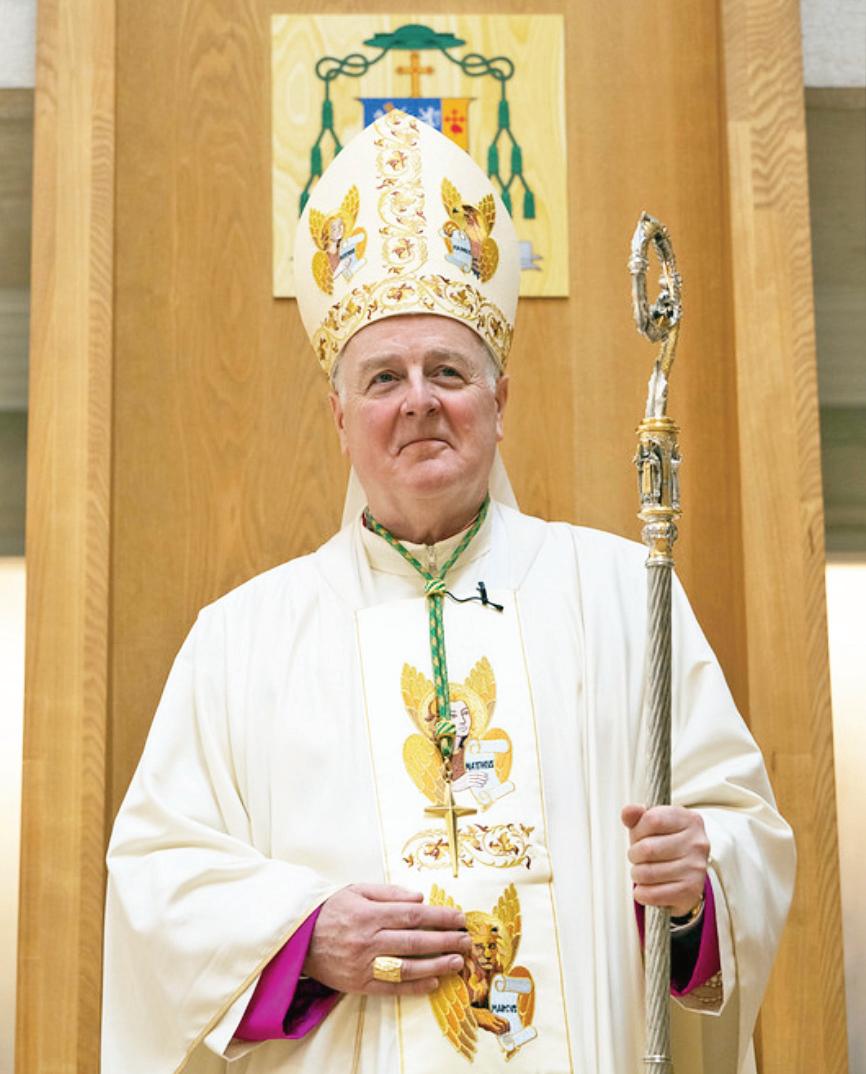
Francis Continued on Page 5
In conversation with Emeritus Bishop Declan
If you have been given the Catholic Post for free in your parish, PLEASE would you be


JUNE 2024
www.CatholicPost.co.uk
able to donate £1 to your parish for it, or even £10 per year!
cliftondiocese.com
Blessed Virgin Mary and of the apostles Peter and Paul, in faith and hope and in fervent charity to nourish that people fully.
SStt A A n n tthhoo n n yy ooff PPaadduuaa ––JJ u u n n ee 1133tthh

CONTACT US:
The Catholic Post is published by its owners Bellcourt Ltd and is wholly independent of and separate from any previous newspaper. The Catholic Post is published on the last Sunday of the month previous to publication date.
EDITOR: Nick Layton
email: editor@catholicpost.co.uk
ADVERTISING:
Charlotte / Bellcourt Ltd. 01440 730399 charlotter@cathcom.org
DESIGN & LAYOUT:
David Lodge, davidl@cathcom.org
PUBLISHED BY:
Bellcourt Ltd. N2 Blois Meadow Business Centre, Blois Road, Steeple Bumpstead, Haverhill, Suffolk CB9 7BN 01440 730399
ARTICLES TO:
The Catholic Post
email: editor@catholicpost.co.uk or davidl@cathcom.org
Please send articles for publication by email, supplying any photos separate to the text We welcome contributions
Here are answers to some basic questions about writing for The Catholic Post How long should articles be?
Usually it seems to work out best if contributors simply say what they have to say and let us worry about finding a spot for it in the paper. What is the submission procedure?
Please send as a Word file attached to an e-mail. To submit articles for publication, send to editor@catholicpost.co.uk
Charts, graphs, and photos should be submitted as separate PDFs. Electronic photos should not be embedded or pasted into a Word document as this reduces their quality.
Photographs and Illustrations
Photographs and Illustrations should be supplied electronically as high resolution JPEG (*.JPG) files).
Photographs and illustrations should be sent in colour with a resolution of 300 dpi and a minimum size of 100 mm x 100 mm when printed (approx. 1200 pixels wide onscreen).
Computer print-outs are not acceptable. Screen captures are not ideal as they are usually not very high
Parental permission should be sought before submitting photographs of minors. Source information -
DW = Diocesan Website.
ICN = Independent Catholic News
Views expressed in The Catholic Post are not necessarily those of the editor Last date for copy is the LAST DAY of the month prior to publication.

The reports of my death have been greatly exaggerated
A funeral is our way of saying our goodbyes to the person who has died and is therefore very much for the living
There is a famous quote attributed to Mark Twain: “The reports of my death have been greatly exaggerated”. I know how he felt. I had had a home visit from an audiologist to check my hearing and, sometime later, contacted him with regard to ordering a hearing aid. He seemed a little surprised to hear from me (no audiology pun intended) having apparently been informed that sometime after his first visit I had died! Exactly how that came about no one seemed to know, but no doubt he was delighted not to have lost a sale and, needless to say, I was even more delighted to still be alive!
My reflection in last month’s Post was on the subject of the “no fuss direct cremations” advertised on television, and the fact that they are not in keeping with the traditional funeral rites of the Church. But there is another aspect to such funerals that should be considered even if they were permitted, and it has to do with the purpose that funerals serve in our culture over and above the basic process of committing a person’s remains to be buried or cremated.
A funeral is our way of saying our goodbyes to the person who has died, and doing so in a respectful and reverent way that hopefully offers support and consolation to the immediate family. In that sense it fulfils an important social and emotional purpose, and for many an important spiritual purpose also, and is therefore very much for the living. We should all therefore consider making funeral arrangements in advance of need, as it were, but not entirely on the basis of “what I want” because, of course, we will be dead. And so whatever plans we might make and whatever arrangements we might put in place, it should be done in discussion with our immediate nextof-kin because they are the ones who will be most affected by our death and, hopefully, most supported by our funeral.
And so for example, if our choice is for burial is everyone else in family OK with that? Or if it is for cremation, is everyone OK with that? If we are regular church-goers our natural choice is probably going to be for a requiem Mass, but if the rest of our family are not church-goers, is it going to be helpful for them to have to sit through a Mass which means little or nothing to them? Would it be better to simply have a funeral service (albeit in church) and make arrangements in our Will for Mass(es) to be offered for us at a later date and which can be attended by those for whom that would be a meaningful thing to do?
Whatever choices we might make, they should be according to the funeral rites of the Church and so it might be advisable to consult our parish priest in order to be sure that what we are requesting can be done, and that from a pastoral point of view they are appropriate –again bearing in mind that we will be dead and therefore what we might want isn’t as important as what might be supportive and consoling to others. The only way to be sure is for us to discuss plans and preferences together as a family.
And this is where we return to the “no fuss direct cremations” being advertised on the television.
Accepting the role that funerals play in saying our goodbyes to loved ones, my fear is that the more popular these “funerals of convenience” become, the more risk there is of family members being deprived of those aspects of a funeral that hopefully offer consolation and comfort. Imagine the fact of someone dying and their body being taken away by a funeral director and their family never seeing them again – because those are the terms of these “no fuss” arrangements. We can’t even use the word funeral because there won’t be a funeral. Those arrangements make no provision for
any sort of gathering or service and therefore no opportunity for family and friends to reverently and respectfully say their goodbyes. All the traditional and cultural aspects of committing the remains of a loved one have been removed in the name of saving money.
I can’t help wondering whether, as a society, we are storing up a lot of emotional crises for the future as a result of unresolved grief. Yes, people can gather socially in a pub somewhere and have a drink to someone’s memory, but it’s not the same and it’s not how a lot of people would choose to say their goodbyes, but it’s being imposed on them by hastily made, uninformed, decisions on the part of people opting for a “no fuss cremation” because it’s what they want - but without thinking about what other people might not only want but need (emotionally).
All of this makes it all the more important that we realise that these “no fuss cremations” are not in keeping with the funeral rites of the Church, principally because the cost of such arrangements do not allow for the provision of a funeral service, whether in church or at the crematorium.
In my earlier reflection I included the words of guidance from a Pastoral Letter of Bishop Mark Davies of the Shrewsbury diocese in which he expressed concern about what he referred to as the rising trend of disposing of bodies without an appropriate funeral by a choice for “no frills” “direct cremations” which, he suggested, trivialise funerals:
‘Sadly we are now seeing funerals being promoted commercially at which no one is to be present, and no prayer is to be offered, and which seem to be devised to prevent participation by family, friends or the community. We must surely be concerned” he said “for the human impact of these developments and recognise the loss of the Christian vision of what should mark our passing from this world.’
Page 2. The Catholic Post. June 2024.
From the presbytery.............. by Fr Neil McNicholas
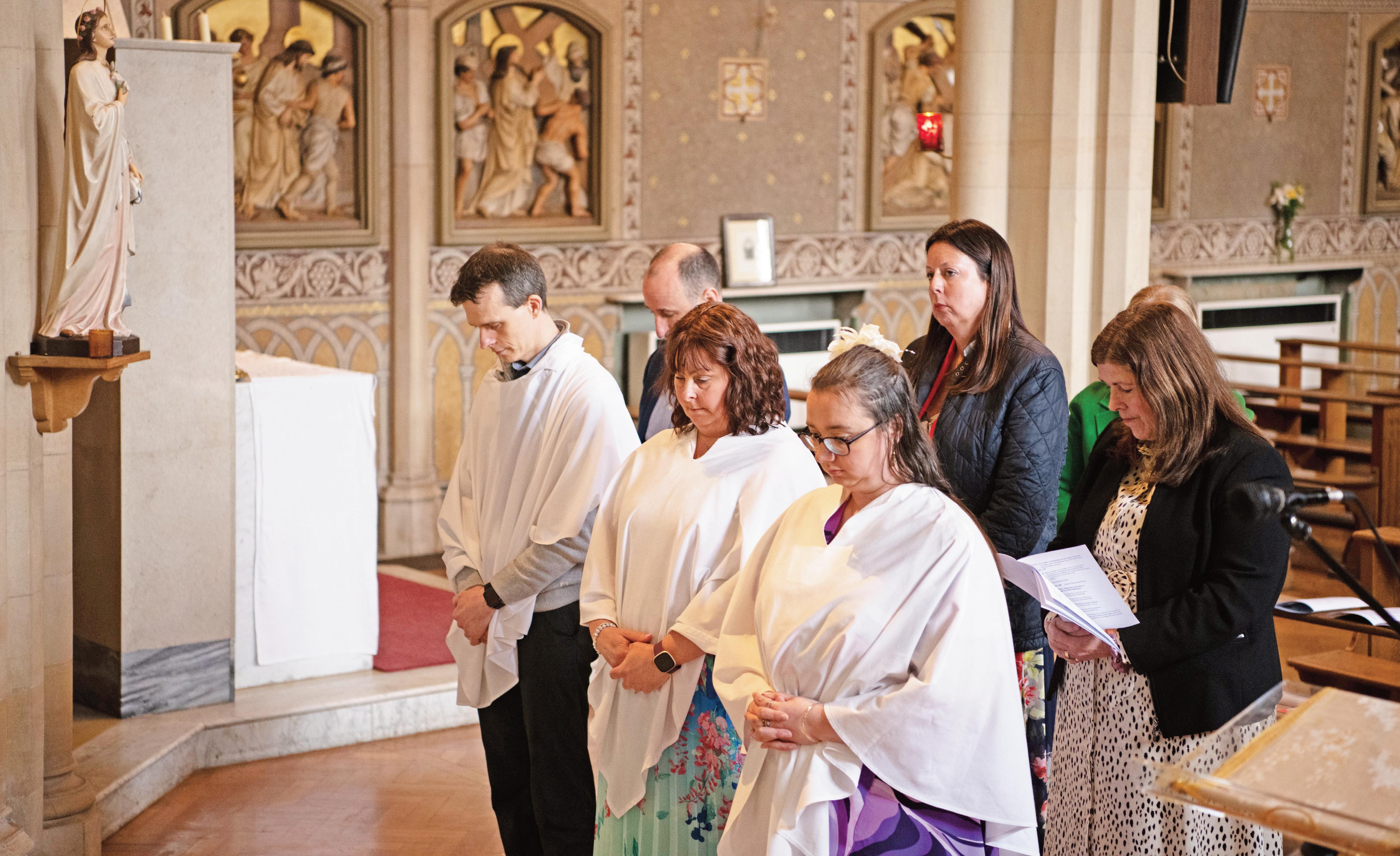
Teachers and staff become Catholics after new programme in
schools
Flushing Toilets!
Recently, we received an S.O.S. from a bishop who has worked alongside us for nearly thirty years and promotes the Holy Rosary throughout his diocese.
A Nursery and Primary school in a rural part of his diocese was in bad repair and had no toilets. The nuns and the many small children, had to go out and use the bushland surrounding the school. It was far from a good situation.
The bishop was so concerned about the unsanitary situation at the school that he asked for help. Due to the bishop’s great care, for a very small sum we have been able to provide for instillation of toilets and washbasins. Pictures of the renovations and of sanitary instillations will be found on our website.
We asked him what the children thought of the toilets: “What do the children think? Are you joking…. Whenever I go there they practically jump on my head with joy. They can’t believe that they have flushing toilets. The sisters too are extremely grateful.”
“It means we can both receive communion together, I know it means so much to her as well.”
An innovative evangelisation programme in the Archdiocese of Southwark has led to four staff members in Catholic schools being received into the Catholic Church.
The project, called “Come and see”, invites non-Catholic staff in schools to join a bespoke Rite of Christian Initiation of Adults (RCIA) programme, where they are supported within school to be received into the Church. It began in 2023 and four staff completed RCIA in April this year.
The “Come and see” initiative is taking place under the vision of Archbishop John Wilson, who has a bold and ambitious plan for parishes and schools in the South London and Kent area to meet people where they are and lead them to Christ. This approach is working, with a decade high number of people being received into the Church this year – a 164% increase compared to last year.
A special Mass was held at St Philomena's Catholic High School for Girls in Carshalton, where staff members from St Ursuline’s High School, Wimbledon and St Philomena’s were received into the Church. This included Emma, who was baptised, and Aideen and Owen who had their confirmations. Another staff member who went through the programme was received into the Church at the Easter Vigil in his parish.
The Mass was led by Canon Victor Darlington, the Archdiocese of Southwark’s Episcopal Vicar for Education, who said: “It is not enough
to say we do not have enough Catholics, we do not have enough Catholic teachers or enough Catholic headteachers. We have to evangelise, invite people in and encourage them to say yes to the Lord.
“It is the power of this invitation that we now have four staff members in schools in our Archdiocese who courageously came forward and said yes to Christ. This is history being made in our Archdiocese and is going to be the roadmap for promoting our faith in our schools and in our communities. I give God all the glory.”
Emma, a staff member at St Philomena’s, was baptised at the Mass spoke about how much it means to her and her daughter – a pupil at a local Catholic school. Emma said: “It means we can both receive communion together, I know it means so much to her as well.”
Owen, a science teacher at Ursuline High School was confirmed into the Catholic Church at the Mass. He said it has had a positive impact on his relationship with his pupils, who have seen him at Mass and questioned why as a science teacher he is a Catholic. Owen said:
“We’ve had some really good discussions about science and faith, how they are not incompatible at all. So that’s been quite a good journey for our students as well and their enlightenment too.”
Deacon Errol Quagraine who is supporting staff members on the programme said: “When
this programme first started, we were worried we would not get anybody. But when we sent the invitation out for people to come and see what the Lord has got for you, they resoundly said ‘yes’ because of what they see happening around them.”
The Come and See project began inviting staff in June last year, with a pilot project at St Philomena’s and Ursuline High which saw Deacon Errol work closely with Headteachers of both schools and the Chaplain of Ursuline High to make the vision a reality. Canon Victor Darlington is aiming to push the pilot out wider across the Archdiocese in a hope to get more teachers and school staff received into the Church.
Owen added words of encouragement to other staff members who are thinking about joining the programme: “Just do it. You do not need to ponder on it too much, by going through the course you will find out whether it’s right for you and it’s done in such an open way that it is easy to do.”
This was echoed by Canon Victor who said: “If you are a teacher and you feel called, it’s never too late. God’s time is the best. Say yes now, we need more people to say yes to the Lord!”
Aideen, who has worked in St Philomena’s for 14 years, felt being fully received into the Church was the next step in her journey. She said “in a Catholic school you have to take part in the Catholic ethos anyway, so don’t be afraid – just go for it”.
The increasing Rite of Election numbers are part of a broader trend of hopeful growth for the Archdiocese. Mass count statistics have increased this year by over 10% too. rcsouthwark.co.uk
The joy is reflected in his thanksgiving blessing for our donors this Pentecost: “You are in our prayer intentions at this special period. May God bless you with a fresh outpouring of the Holy Spirit of courage, trust and peace. May God reward you for all your good works. May the Holy Spirit endow you with greater love, keep you safe from all harm and grant you fulfilment deep in your soul. May that same Spirit bring you peace and grant you victory in the face of your own challenges. May God bestow you with wisdom of heart to know what is right to do always and bring you to a new Pentecost. Amen”.
+Bishop Emmanuel Badejo. Small actions can make a big difference. Your support is so very appreciated. Thank you.
www.crownofthorns.org.uk email: office@crownofthorns.org.uk
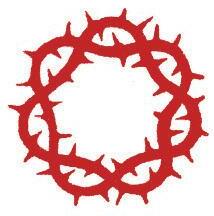
Promoting the Holy Rosary in the U.K. & throughout the world to bring hope, comfort and peace to the marginalised, the oppressed and the imprisoned, enabling wounded hearts to find healing and shattered lives to find breath and space to renew.
Supporting priests and chaplains in their ministry, outreach and welfare.
“I am the Lady of the Rosary. Continue always to pray the Rosary every day.” (Our Lady at Fatima) www.crownofthorns.org.uk
email: office@crownofthorns.org.uk Phone: 01342 870472
Registered charity no: 1042751
Crown of Thorns Mission of Hope The Catholic Post. June 2024. Page 3.
Salford Cathedral: Towards becoming the most carbon neutral cathedral in the country
“When you build a new building, you’re using a lot of energy. But we’ve already got an existing building, and this has already got all that carbon captured in it.”
As work to restore the glory of Salford Cathedral progresses, deliberate efforts are being made to achieve the ambitious goal of making it the most carbon neutral cathedral in the country.
Neil Moss, Project and Site Manager of the Simpsons of York – the company contracted to carry out the cathedral restoration project, shared some updates with visitors during a recent cathedral tour, pointing out that the restoration project is a journey towards achieving a sustainable and environmentallyconscious future.
Our sustainability efforts
Highlighting some of the steps taken on this journey, Neil disclosed that since the beginning of the restoration work at the cathedral, no waste has been sent to a landfill site and all the waste generated so far have been completely recycled.
“When you build a new building, you’re using a lot of energy. But we’ve already got an existing building, and this has already got all that carbon captured in it. It’s already present in the natural products that have been there for 150 years.
Neil explained how the Victorian stained-glass windows are being taken to a workshop to be carefully cleaned, repaired, restored where necessary, and placed between environmental protective glazing to help conserve the glass for the future and help address problems with heat loss from the building.
Speaking on other plans that are in place to achieve the desired sustainability goal, Neil said it is hoped that the cement plaster used to build the cathedral will be scraped and replaced all through with the eco-friendly lime plaster and a rainwater recycling system through which collected rainwater is saved and prepared for further use and reuse will be set up.
He added that the Cathedral will not have to rely on electricity or gas as plans are underway to install a natural underfloor heating system.
A lifetime experience
Taking place each month, the cathedral tours have been an opportunity for parishioners and visitors to be part of the story by going behind the scenes to view the restoration work firsthand.
Neil described the tours as “once in a lifetime experience that gives you the rare chance to see what you wouldn’t normally see and gain some knowledge of how the work is being done”.
So, all the waste generated from any material we use, we send it to a waste transfer station, and it gets recycled. And currently, we are a hundred percent recycling, so we’ve not sent anything to a landfill site from waste.” dioceseofsalford.org.uk
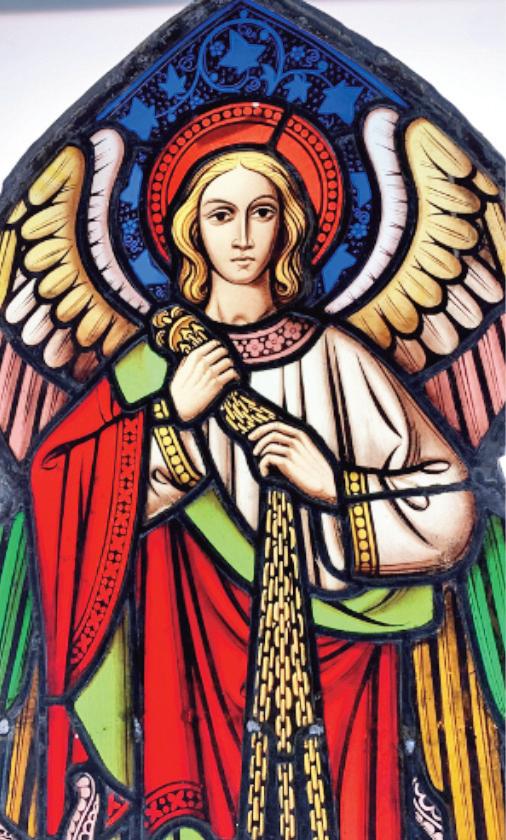
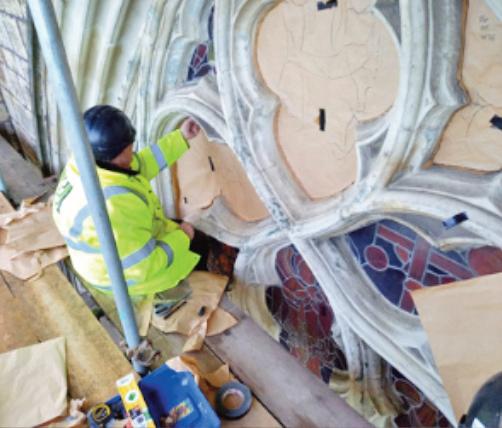
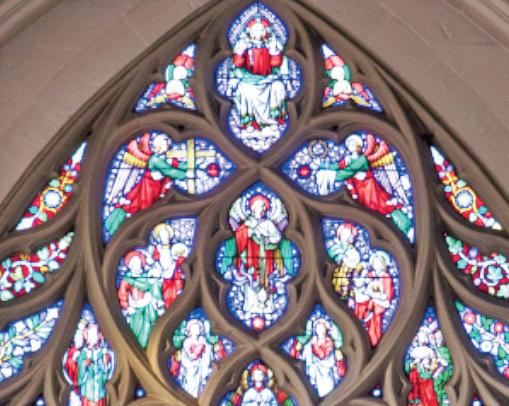

“This is a once in a lifetime experience. You are never going to get into this cathedral as it is now, ever again!
A visiting couple, Kevin and Sandra also shared their experience; “The tour is very informative! If you come to the tour, you’ll really be impressed by the work that is being done. We are very pleased. We have generations of families – our great grandparents, grandparents and parents married here at the Cathedral.
“Something very interesting for us was the bishop’s tree which tells the story of the history of the church and existence of the church during and after the reformation. When we used to come here, it was all painted up but now with the work going on, we could see the patches of the letters on the wall. It’s wonderful”.
For updates on the restoration journey of Salford Cathedral go to www.salfordcathedral.co.uk/restoring-theglory/progress/

Page 4. The Catholic Post. June 2024.
Continued from page 1
Bishop John Bosco MacDonald, known as Bosco, was born in Bath on 21 July 1963. He was baptised at the parish church of St Mary’s in the city.
He studied at the seminary in Valladolid, Spain, and was ordained a priest for the Diocese of Clifton at St John’s in Bath on 6 July 1991.
His first appointment of his diocesan ministry was at the Cathedral parish as an assistant priest, before being made parish priest of St John Fisher in Wellington from 1995-1998. He then moved to Holy Family, Patchway.
In November 1997, Bishop-elect Bosco was appointed the Diocesan Coordinator of
Chaplains for Primary, Secondary and Sixth Form sectors, and from 1998–2023 was a member of the Retired Priests Committee.
On New Year’s Day 2003, he was appointed Dean of Bristol North West and held the role for four years.
His next parish appointment was to St Gregory the Great with St Thomas More in Cheltenham. During this time, in March 2009, he was Installed as Canon of the Cathedral Chapter.
In 2010, Bishop Bosco was appointed Amicus Clero for the diocese. The term means ‘friend of the clergy’ and the incumbent offers a listening ear for any priest with pastoral or personal concerns.
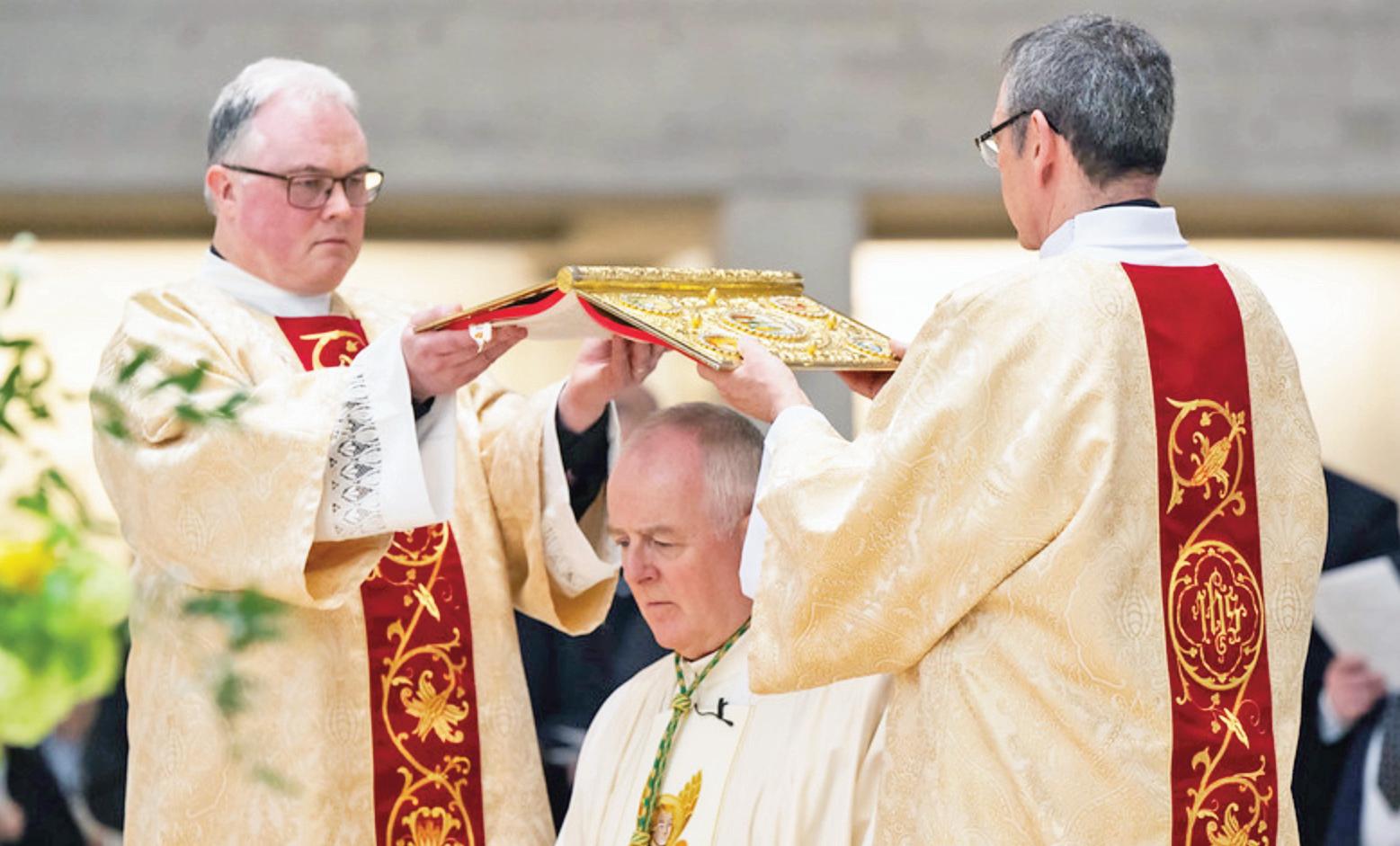

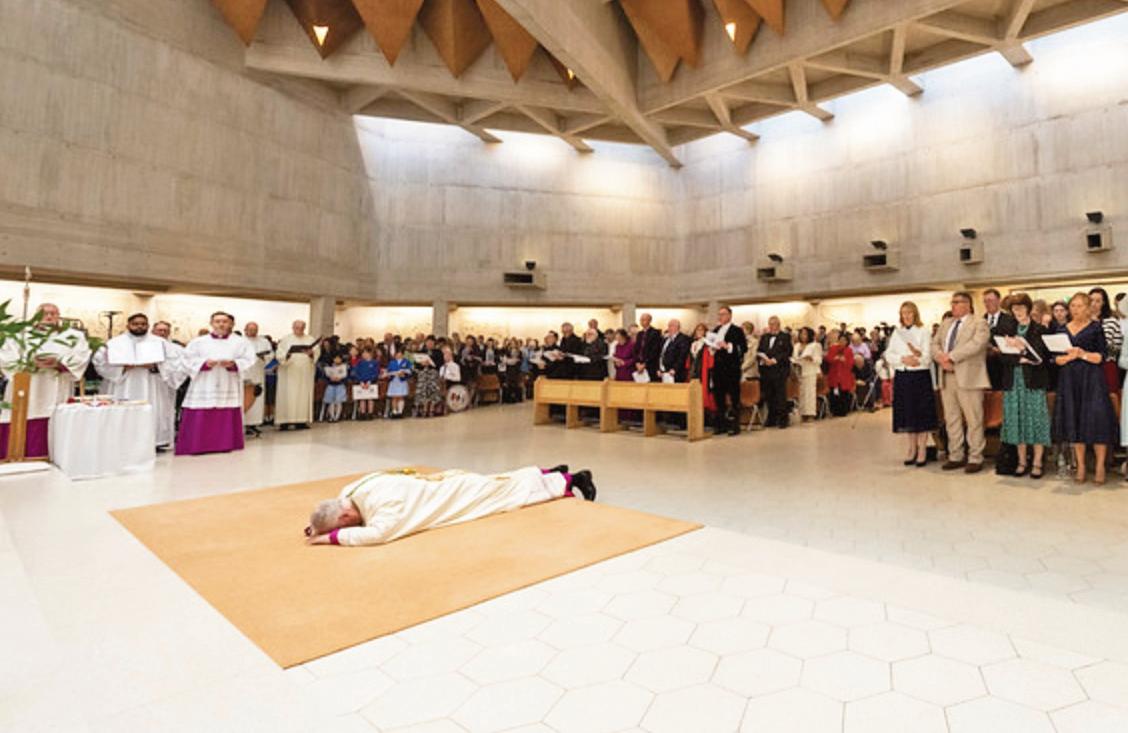

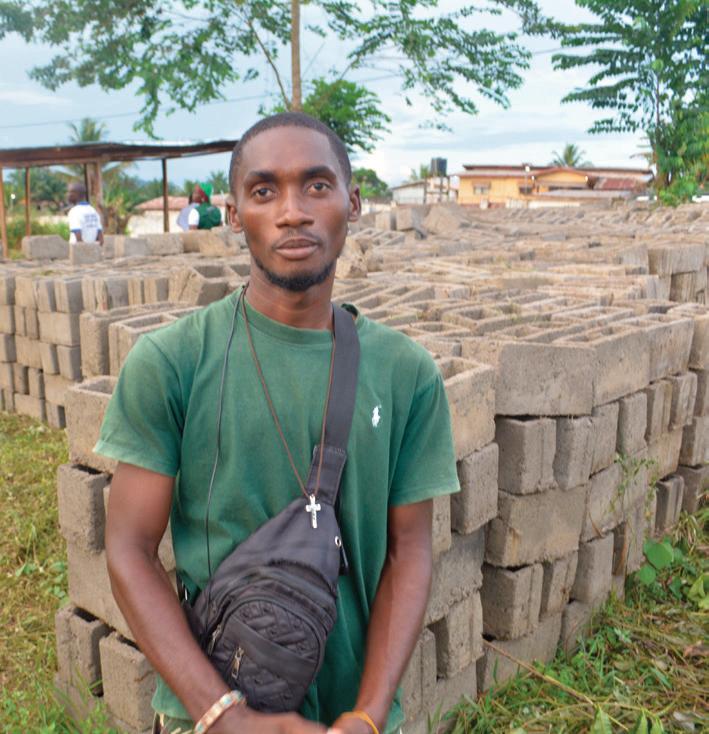

The Catholic Post. June 2024. Page 5. Rev/Sr/Mr/Mrs/Miss: Address: Postcode: Aid to the Church in Need I enclose £100 £50 £25 Other £ to help Christians in Liberia. I enclose a cheque to Aid to the Church in Need OR please debit my VISA/MasterCard/Amex/Maestro Expiry Date: / Valid From Date: / Issue No: (Maestro) Signature strip code (last block of digits): Signature: Date: Please send me information about setting up a regular gift. Yes, I would like to boost my donation by 25p of Gift Aid for every £1 I donate. Yes, want to Gift Aid my current donation and any donations I make in the future or have made in the past 4 years to ‘Aid to the Church in Need’. I am a UK taxpayer and understand that if pay less Income Tax than the amount of Gift Aid claimed on all my donation in that tax year it is my responsibility to pay any difference. Gift Aid is reclaimed by the charity from the tax you pay for the current tax year. Your address is needed to identify you as a current UK taxpayer. A24P1CP Please photocopy this form if you do not want to cut your copy of the Catholic Post. 0345 646 0110 | www.acnuk.org | acn@acnuk.org 12-14 Benhill Avenue, Sutton, Surrey SM1 4DA A registered charity in England and Wales (1097984) and in Scotland (SC040748) PHONE: 0345 646 0110 To donate and to hear a message from Oliver: www.acnuk.org/ liberia-cp-donate SCAN QR CODE TO DONATE ‘We want to build a church to honour God. We have the bricks but we need help.’ In 2003, just five people would meet for Holy Mass in a parishioner’s front room. By 2024, the parish had swelled to 210 people and they badly need a proper church. Parishioners have made the bricks by hand but need £60,000 to build a church to serve the whole community. Liberia is one of the world’s poorest countries. Will you help answer Oliver’s call to build a House of God? Your kind donation today will help bring Christ’s love to Christians in need.
Oliver – Youth Leader at Divine Mercy Parish, Fishtown, Liberia
Liberia Appeal
Archdiocese of Liverpool makes seventh trip to Ukraine
liverpoolcatholic.org.uk
The latest trip was also a chance to show the people of Ukraine that they are not alone
The Archdiocese of Liverpool recently set off on its seventh trip to Ukraine as part of its #Liverpool4Ukraine appeal.
The trip, which set off on 16 April 2024, is the latest in the archdiocese’s support of Ukraine. It has been over two years since the Russian invasion, a month later, the first trip was completed.
The latest supply was made possible thanks to donations from The Brick, Wigan, the Archdiocese of Liverpool and its partners Greenmount Projects.
In total, 120 boxes of aid will be making the trip over to Ukraine, including seven pallets which have toiletries/sanitary products, food, toys, blankets and bedding, dried food and medical aid. As well as that, there will also be Personal Protective Equipment (PPE), sanitizer and body bags.
The aid was gratefully received by Andrew Quinlan on behalf of Bishop Gregory Komar from the Ukrainian diocese of SambirDrohobych. As the auxiliary bishop of the
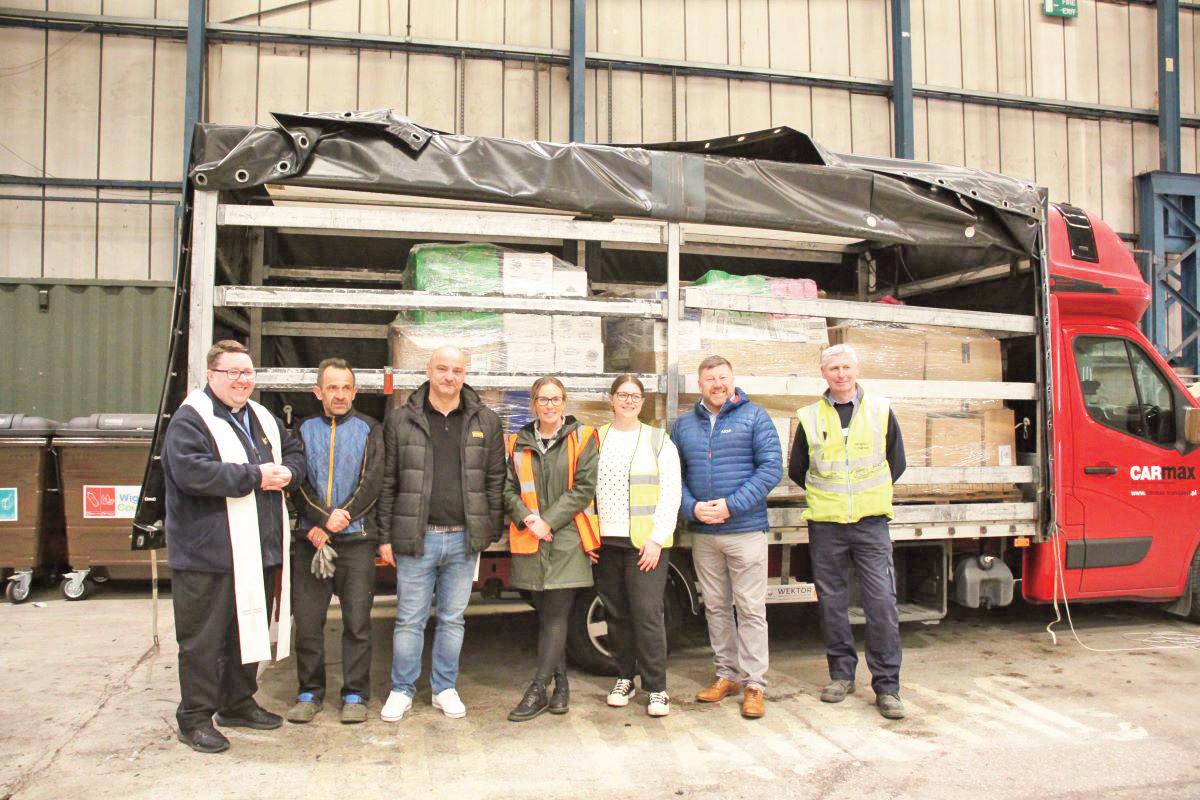
diocese, with a close association with the Archdiocese of Liverpool, Bishop Gregory played a crucial role in distributing the goods across the Lviv region of western Ukraine.
Chief Operating Officer Martin Miller said: “It’s always a privilege to be able to help the people of Ukraine in this way.
“Since the Russian invasion, people have been displaced, and feeling that they have lost everything. We hope that by continuing to help in this way, we can help give them a boost.”
The latest trip was also a chance to show the people of Ukraine that they are not alone.
Whether it be through prayer, or donating something physical or financial, the people of the archdiocese, not for the first time, have got behind the people of Ukraine, and made a meaningful impact in their lives.
Donations are very much still welcome.
Migrants Mass celebrated at St George's Cathedral
Our life together is better because of you
At the Annual Mass for Migrant Workers, Archbishop John Wilson thanked migrants for the “immense” contribution they have made to the UK.
Archbishop John highlighted the difference people from around the world have made, especially in the NHS. He thanked people who have left their homeland to work here, saying: Our life together is better because of you. Our life together is better because of the skills, the service, and the contribution you give. Our life together is better because of the diversity of cultures you bring to our communities. rcsouthwark.co.uk
Drawing on St Joseph, the Archbishop said he was his model for all workers and asked for St Joseph’s intercession as he prayed for “the protection of workers and their rights”.
The Archbishop reminded us that the Lord Jesus himself learned to work as a carpenter, which “prepared him for the work of salvation on the wood of the Cross”. The Archbishop also highlighted that the commandment from the Lord Jesus to love God and to love our neighbour as ourselves has no exceptions.
You can read the Archbishop’s homily in full by visiting www.rsouthwark.co.uk
With thanks to Marcin Mazur (©Mazur/cbcew.org.uk) for the photo.
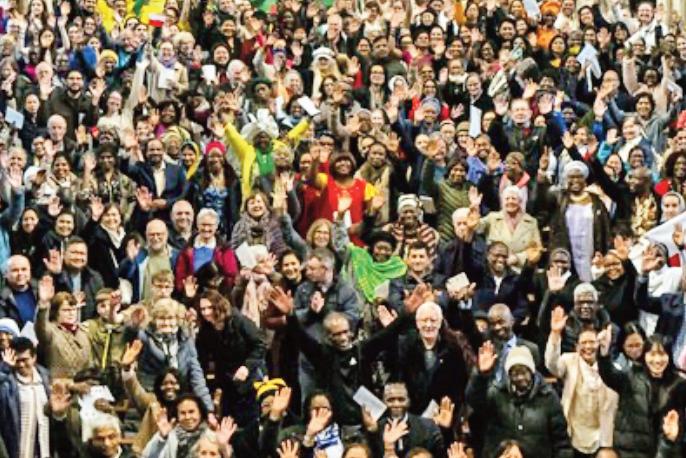
Page 6. The Catholic Post. June 2024.
Giving back, in gratitude
What are you thankful for, in your life?
Your
Catholic Legacy
“Let
them thank the Lord for his steadfast love, for his wonderful works to humankind.” Psalm 107:8
This year marks a whole decade of more than 20 charities working together, through Your Catholic Legacy, to encourage people like you to remember Catholic causes in your Will. The milestone prompted us to look back, with thanks, over the last 10 years…
We remembered kind people whose legacy gifts have changed lives and transformed ministries. We chatted about the survey which showed Catholics are more generous than most people. We recalled the time you ‘shared your Saint’ and told us about the heroes of faith who inspire you.
Looking back with gratitude is good for us. After all, Scripture says we should ‘give thanks
in all circumstances, for this is the will of God in Christ Jesus for you.’ (Thess 5:18).
So, today, please join us in looking back over the last 10 years of your life – and tell us what makes you thankful.
We’d love to know what fills your heart with gratitude. We’ll publish all the messages of thanksgiving on our website, so you can be inspired by other Catholics.
As well as looking back, we invite you to look forward too… Many people choose to express gratitude by leaving a gift in their Will to Catholic causes. It’s a way to give back, in thanks to God, for all we’ve been given. And it’s a gift of faith which will continue through generations.
Please could you consider a gift in your Will to Catholic causes today?
Thank you so much. Visit yourcatholiclegacy.org.uk to tell us what you’re thankful for and find out how to leave a gift in your Will.
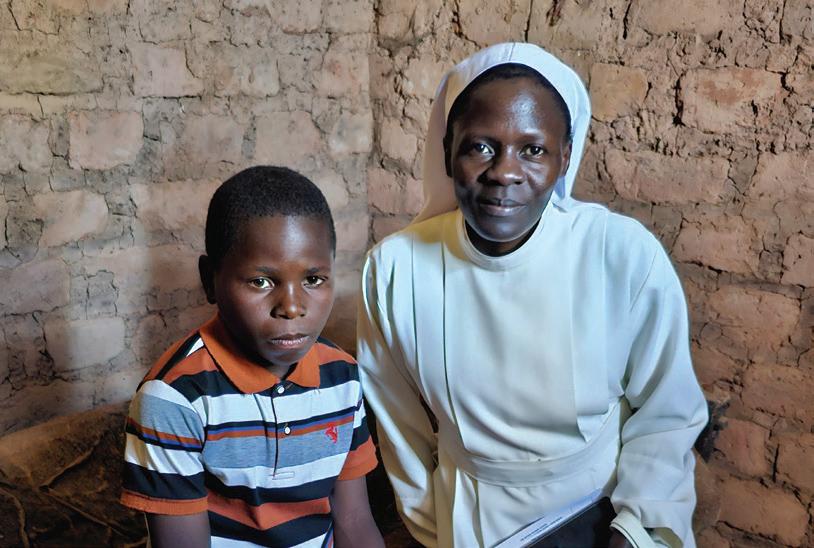
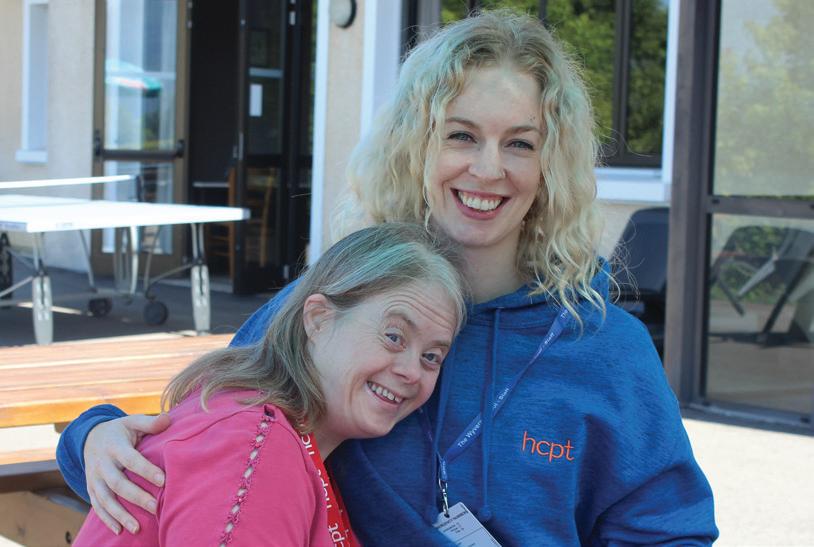
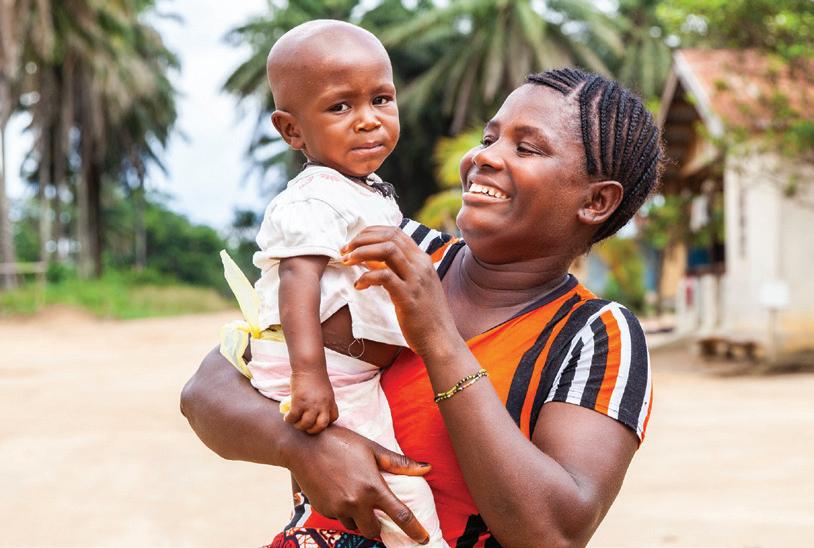
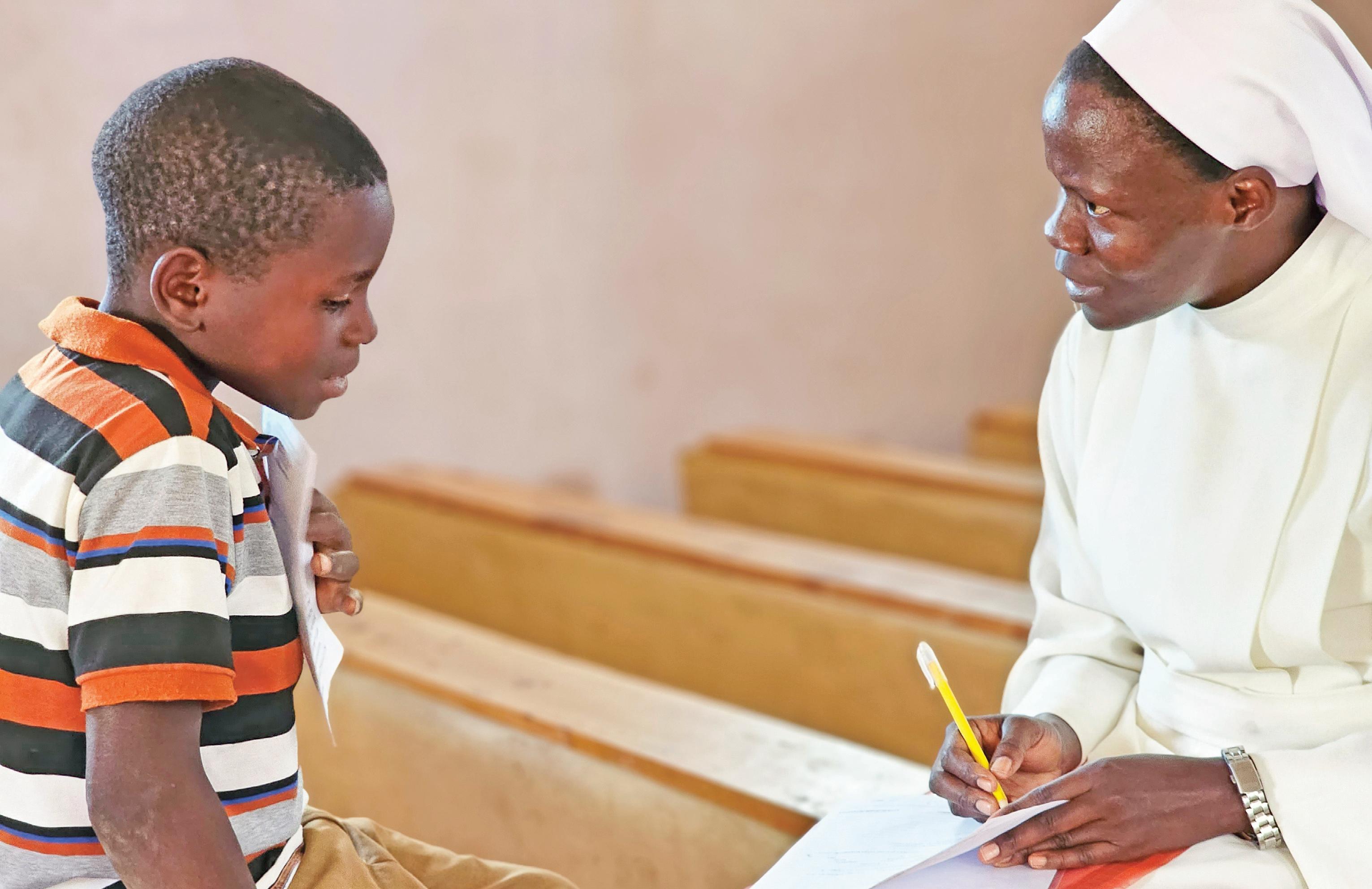
Give back in gratitude Leave a gift in your will to a Catholic charity
What
What are
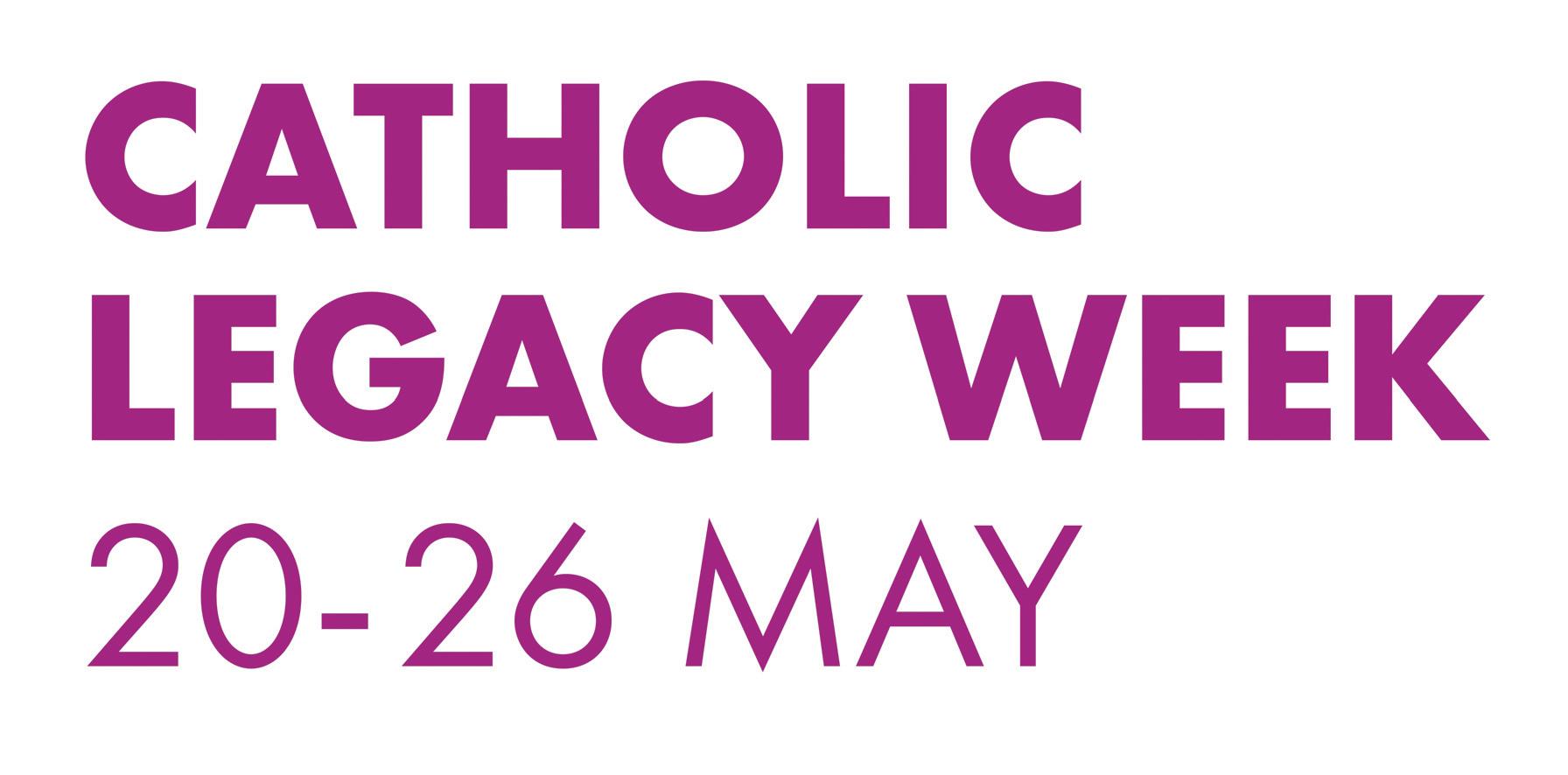
are you
you
than k ful for? thankful
(Plenty of people are thankful for YOU)
At Your Catholic Legacy we’ve been working together for a whole decade. Looking back, we’re grateful for people like you who have pledged gifts in your Wills to Catholic causes.
When you look back over the last 10 years of your life, what makes YOU thankful?
Tell us what you’re grateful for.
A gift in your Will is a way to express your gratitude to God for all you’ve been given. It’s a way to give back, in thanks.
Please could you consider a gift in your Will to Catholic causes today?
Visit yourcatholiclegacy.org.uk to tell us what you’re thankful for and find out how to leave a gift in your Will.
CATHOLIC LEGACY WEEK 20-26 MAY
TEN YEARS OF WORKING TOGETHER
The Catholic Post. June 2024. Page 7.
Credit: CAFOD/Thom Flint Credit: World Villages for Children Credit: HCPT
The Diocesan Almanac, Directory and Yearbook: An Invaluable Archival Reference
Robert Finnigan KSS, Leeds Diocesan Archivist
Nearly a century of Yearbooks train a spotlight on how one diocese has adapted to an era of change in society and in the Church itself.
Shortly before the 2024 edition of the Diocese of Leeds Yearbook was published Bishop Marcus Stock thanked the editorial team and went on to say that the annual publication provides a very valuable physical record and guide to the life and mission of our Diocese, not only for immediate use but also for archival reference. As part of the team, I appreciated the Bishop’s expression of gratitude, but as the Diocesan Archivist, I was even more heartened by his mention of archival reference. In the digital age we do sometimes wonder if ‘the end is nigh’ for a hard copy annual publication like the Yearbook. So, it was good to read the Bishop’s affirmation of its on-going importance.
The Yearbook was first published, as the Almanac and Directory, in 1927 at the instigation of the then Bishop of Leeds, Joseph Robert Cowgill. In his preface to the second edition Bishop Cowgill noted that:
“last year, in welcoming the first publication of the Diocesan Almanac and Directory, we spoke about the long felt need of some means of chronicling the interesting events of the Diocese and of giving information concerning its various activities. Proof of such need was soon forthcoming in the eager way in which all the copies were bought up.”
In that sense, little has changed in nearly 100 years: the print run of the 2024 Yearbook sold out by Christmas.
The Directory for 1951 included an obituary for the third Bishop of Leeds, the Rt Rev Henry John Poskitt who died in February 1950 after a long illness. Bishop Poskitt had succeeded Bishop Cowgill in 1936 and was a great believer in the role of the Directory as vehicle for promoting the diocese as a community and as a counterweight to parochialism. After the end of the War in 1945 he commended the publication as a convenient handbook giving information with regard to all the parishes and the various societies and good works which exist in the diocese. He believed that every Catholic should take an interest, not only in his own parish, but in the whole work and wellbeing of the diocese.
The 1952 edition opened with a foreword by the new Bishop, John Carmel Heenan. His episcopate saw the advent of obituaries being published in the Directory for all diocesan clergy as a matter of course; previously it had been the practice to memorialise only ‘senior men’ such as Vicar Generals and Provosts of the Cathedral Chapter. Over time these
obituaries have created an important resource for anyone researching the history of a parish or the lives of individual priests. They also point to a recent trend characterising the ministry of a diocesan priest. In the 1974 edition there were five obituaries; reading them one discovers that on average these men spent twelve years after ordination before being appointed as a Parish Priest. Fifty years later the 2024 Yearbook records the appointment of three new Parish Priests, with an average of just five years’ experience as an assistant priest. A constant in the Directory and Yearbook has been the List of Ordinations. Here again there are contrasts over time; thirteen ordinations in 1940, thirteen in 1965 but only seven in 1990. Since 2000, there have been years when no such list has appeared in the Directory.
The 1950s were a seminal era in the history of the local Church as it sought to establish new parishes to keep up with suburbanisation, and to expand its educational provision to meet the demands of the 1944 Education Act and the post-war ‘baby boom’. In truth, the need for new churches and schools had been evident since the 1930s when the government embarked on a great slum clearance drive. The 1936 Diocesan Directory put it this way:
“The pulling down of houses in the slum areas of our towns – most heartily approved of by all right-minded men – and the consequent dispersal of the people in outlying districts has created almost insoluble problems for the Church Authorities, on whom rests the responsibility of providing them with the opportune means of practising their religion.”
Time after time the evidence from the annual Directory is that this provision did not materialise for many years, if not decades. For example, the biggest inter-war housing estate in Leeds did not witness the completion of a permanent Catholic church and parish school until 1961 - twenty-three years after the parish was founded.
The 1957 Directory was Heenan’s last as Bishop of Leeds before his departure to become Archbishop of Liverpool. Seven new church openings were reported, with a further six recorded the following year. He was succeeded by George Patrick Dwyer as the sixth Bishop of Leeds. Bishop Dwyer became the Archbishop of Birmingham in 1965 and was succeeded in Leeds the following year by Bishop William Gordon Wheeler. In October 1965 Dwyer wrote a farewell preface for the 1966 edition of the Directory in which he

sought to record the ‘progress’ the Diocese had made under his leadership. Some things, he said, stood out:
“First, the splendid range of schools we have built: 41 new or rebuilt Primary Schools; 14 Secondary Modern; 1 Comprehensive; 4 Grammar Schools; 1 Special School; I Approved School for boys. And now 2 Training Colleges for teachers are in the process of building and 2 further Secondary Modern. Next, the increasing number of ordinations to the priesthood, the four volunteer missionaries we have sent to Peru and the two to Africa. Then there is the increasing apostolate of the laity and the eagerness of our young people to be trained for this work. Another sign of the times has been the growth of the Catholic Marriage Advisory Councils. Finally, not the least of our blessings have been the increasing contacts and affectionate understanding with other Christians and with our Jewish brethren.”
Until his retirement in 1985 Bishop Wheeler used his foreword to each edition to review the events of the previous year. From 1967 onwards the Directories testify to his attempts to implement the teachings of the Second Vatican Council at diocesan and parish level. Entries begin to appear for innovations such as the Diocesan Pastoral and Ecumenical Centre at Wood Hall, the Diocesan Pastoral Council, and the Justice and Peace Commission. Individual parish entries point to the formation of Parish Pastoral Councils and Parish Finance Committees. The 1972 edition recorded the ordination of the country’s first Permanent Deacons, by Bishop Wheeler in May 1971.
Under Bishop David Konstant, Bishop of Leeds from 1985 to 2004, the format of the Diocesan Directory remained largely unchanged, but with one exception. In 1991 the dedicated Annual Review section was included for the first time and has appeared in every edition since then to record the details of significant
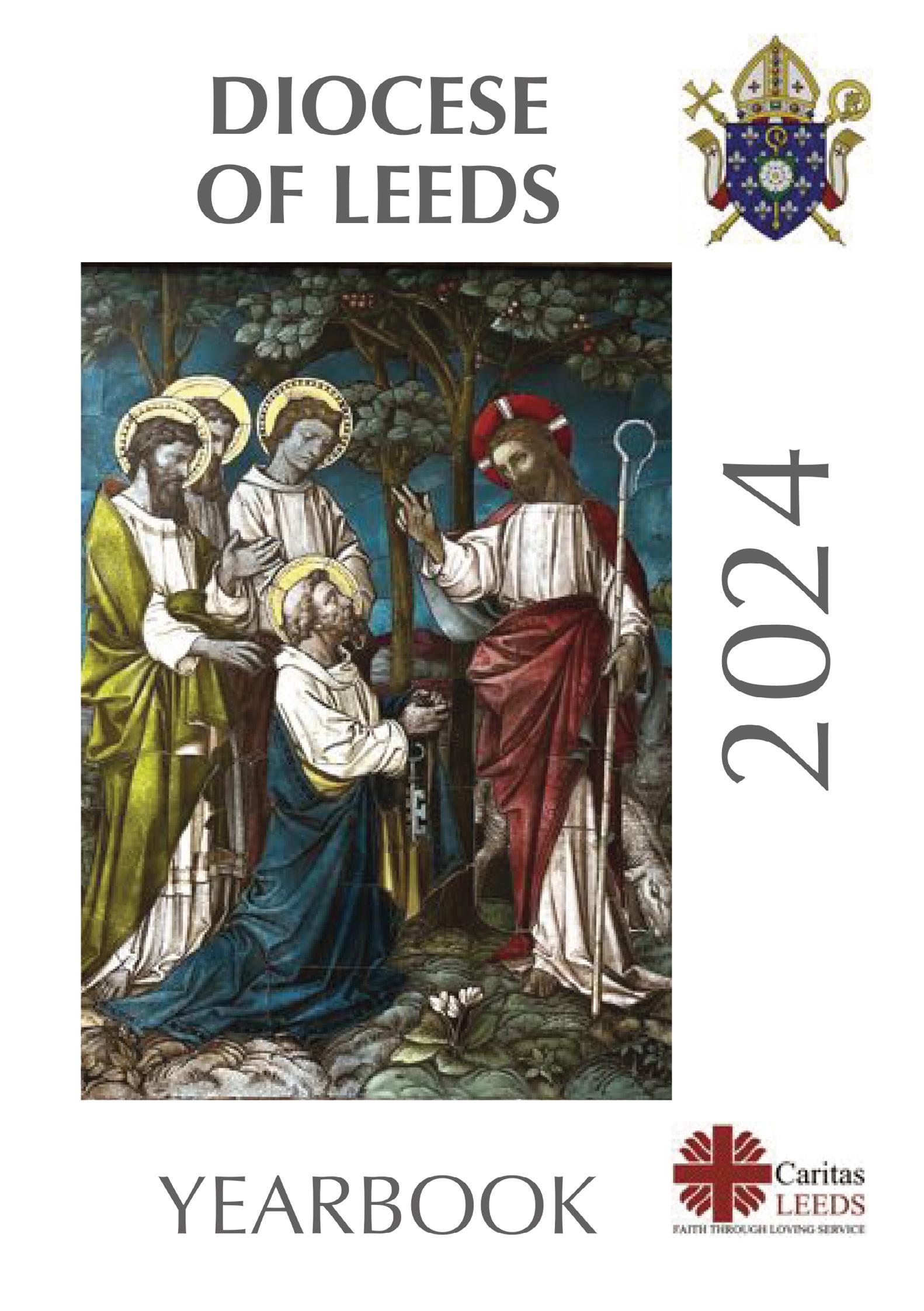
events and developments in the life of the Diocese. Some of these recur, such as the annual pilgrimages to Lourdes and Walsingham, while others are out of the ordinary – such as the Diocesan Pastoral Assembly of 1991, the opening of Hinsley Hall in Headingley in 1999 and the appointment of Bishop Roche to the Dicastery of Divine Worship and the Discipline of the Sacraments at the Vatican in 2012.
In 1987 the annual parish census was published in the Directory for the first time, and this has continued down to the present day, providing more than thirty-five years of data on, for example, baptisms, confirmations, marriages, and Mass attendance at both parish and diocesan level. In the period since 1987 the parochial structure has changed significantly. Then there were 131 parishes in the Diocese sending their statistical returns; in 2024 the number is seventy-six. Similarly, while there were 193 churches, chapels, and Mass centres in 1987, eighty of these have closed in the years since then. Hard decisions to rationalise pastoral provision in the Diocese were taken at various times in the 1990s and early 2000s to take account of fewer priests, declining Mass attendance and financial constraints. The changing shape of the Diocese in recent times can, therefore, be traced most directly from the information presented each year in the Directories and Yearbooks.
Nearly a century of the Leeds Almanacs, Directories and Yearbooks, train a spotlight on how one diocese has adapted to an era of change in society and in the Church itself. When the 100th edition is published in Advent 2025 its readers will be living in communities whose belief systems and social norms bear little resemblance to those that held sway when the first edition appeared towards the end of 1926. Fortunately, we possess a valuable archival reference that has preserved the collective memory of the challenges and changes experienced by the local Church.
Page 8. The Catholic Post. June 2024.
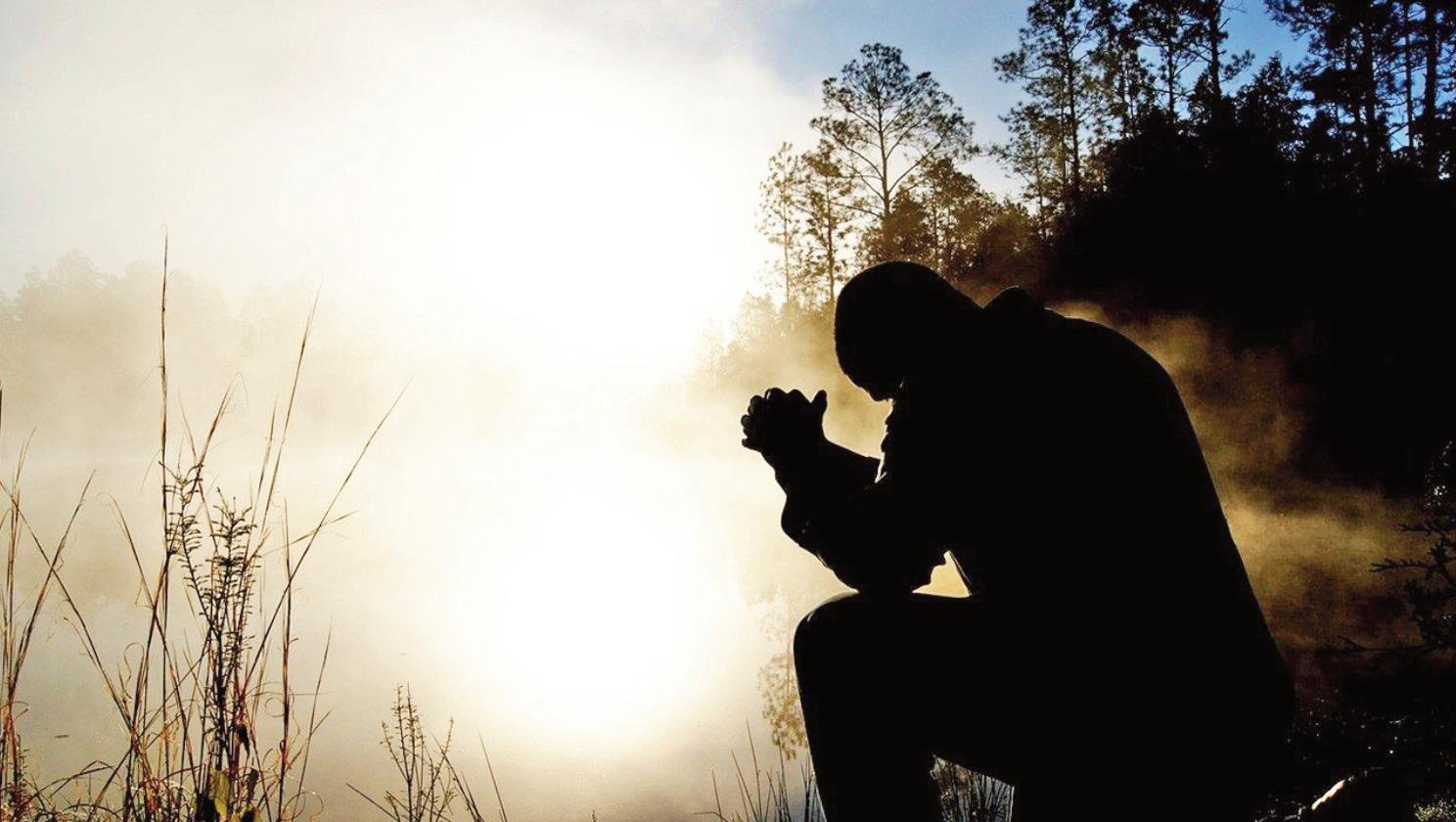
Vatican releases new norms on alleged supernatural phenomena
These time periods sometimes contrasted with the urgency to give pastoral responses for the good of the faithful.
Neither the local bishop nor the Holy See will declare that these phenomena are of supernatural origin, but will only authorise and promote devotion and pilgrimages
A new document from the Dicastery for the Doctrine of the Faith published on Friday, May 17, has updated the norms for discerning alleged supernatural phenomena. The norms came into force on Sunday, May 19, the feast of Pentecost. The procedure allows for faster decisions while respecting popular devotion. As a rule, the Church’s authority will no longer be engaged to officially define the supernatural nature of a phenomenon, a process that can require large amounts of time to thoroughly study an event.
Another new norm involves the explicit involvement of the Dicastery for the Doctrine of the Faith, which must approve the local bishop’s final decision and which has the authority to intervene motu proprio (on one's own initiative) at any time.
Many cases in recent decades have involved the former Holy Office, even when individual bishops have expressed themselves. However, the interventions have usually remained
behind the scenes and were never made public.
The Dicastery’s new explicit involvement also relates to the difficulty in circumscribing phenomena, which in some cases reach national and even global dimensions, “meaning that a decision made in one Diocese has consequences also elsewhere.”
Reasons for the new norms
The document originates from the long experience of the last century, which saw cases where the local bishop (or bishops of a region) rapidly declared a phenomenon’s supernatural nature, only for the Holy Office to express a different decision later. Other cases involved a bishop saying one thing and his successor deciding the opposite (regarding the same phenomenon).
Each event also required lengthy discernment periods to evaluate all elements in order to reach a decision on the supernatural nature or non-supernatural nature of the phenomena.
The Dicastery began revising the norms in 2019, leading to the current text approved by Pope Francis on May 4.
Spiritual fruits and risks
In the document, it is explained that, “many times, these events have led to a great richness of spiritual fruits, growth in faith, devotion, fraternity, and service. In some cases, they have given rise to shrines throughout the world that are at the heart of many people’s popular piety today.”
However, there is also the possibility that “in some events of alleged supernatural origin,” serious issues that harm the faithful may arise. These include cases where from the alleged phenomena, “profit, power, fame, social recognition, or other personal interest” (II, Art. 15, 4°) are derived, even to the point of “exerting control over people or carrying out abuses (II, Art. 16).”
Positive and negative criteria
The document lays out several positive criteria to evaluate the alleged supernatural phenomenon.
These include: “the credibility and good reputation of the persons who claim to be recipients of supernatural events or to be
directly involved in them, as well as the reputation of the witnesses who have been heard...; the doctrinal orthodoxy of the phenomenon and any messages related to it; the unpredictable nature of the phenomenon, by which it is evident that it is not the result of the initiative of the people involved; and, fruits of the Christian life” (II, 14).
The negative criteria involve: “the possibility of a manifest error about the event; potential doctrinal errors...; a sectarian spirit that breeds division in the Church; an overt pursuit of profit, power, fame, social recognition, or other personal interest closely linked to the event; gravely immoral actions…; psychological alterations or psychopathic tendencies in the person that may have exerted an influence on the alleged supernatural event; and, any psychosis, collective hysteria, and other elements traceable to a pathological context” (II, 15).
Finally, “the use of purported supernatural experiences or recognized mystical elements as a means of or a pretext for exerting control over people or carrying out abuses” (II, 16) is considered of particular moral gravity.
Regardless of the final approved determination, the diocesan bishop “must continue to watch over the phenomenon and the people involved, exercising his ordinary power” (II, 24).
The Catholic Post. June 2024.. Page 9.
Vatican News
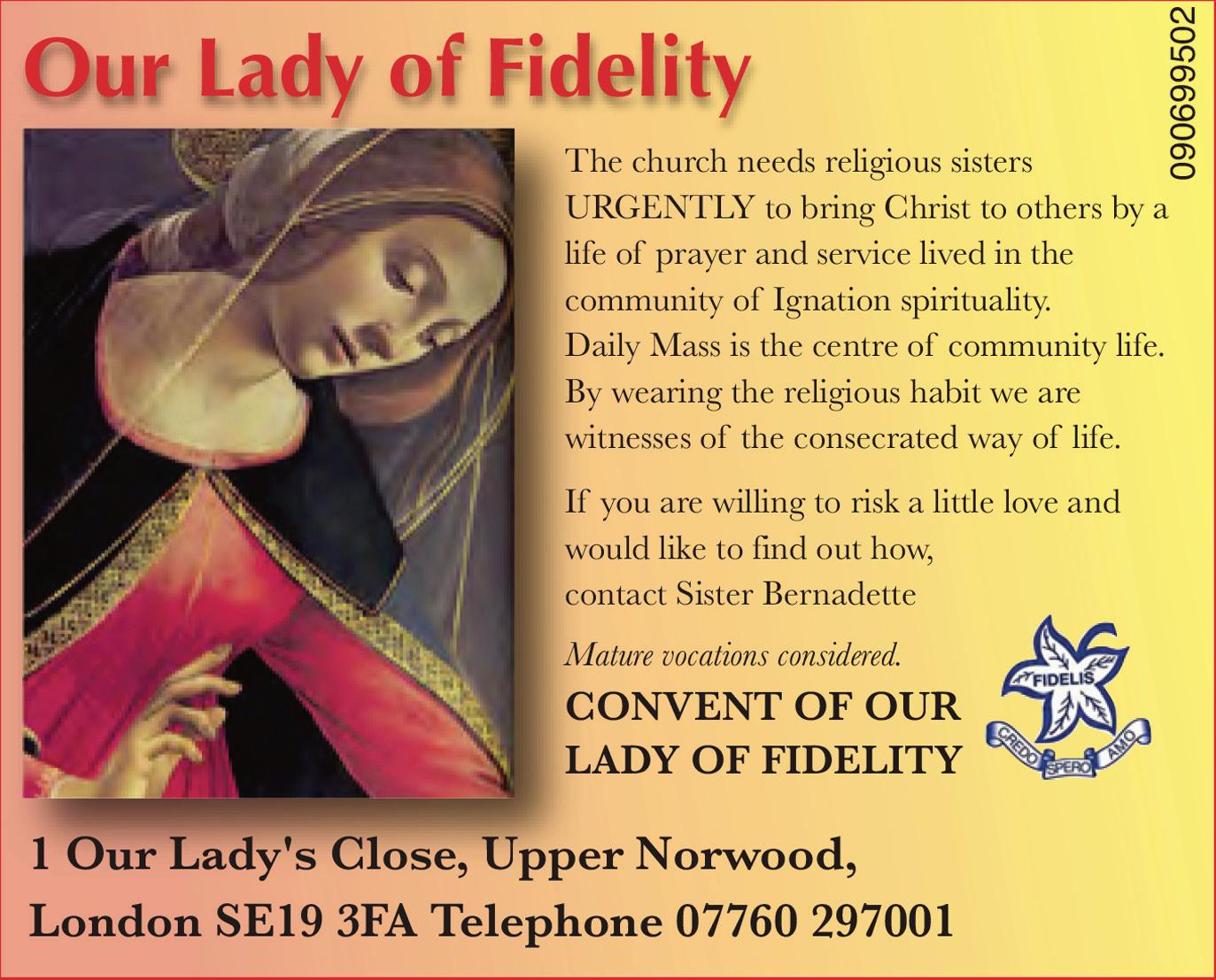


View from the Pew
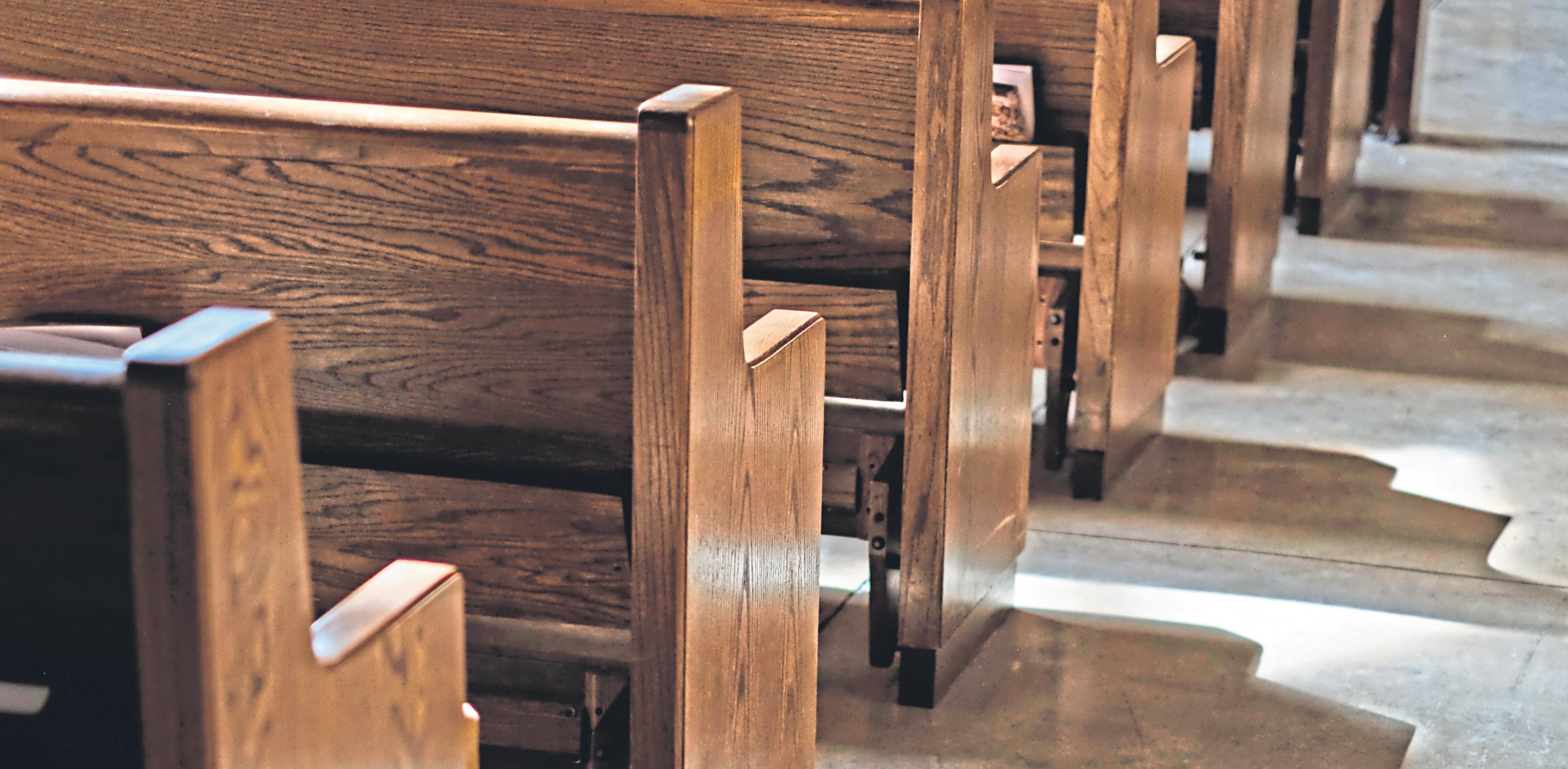

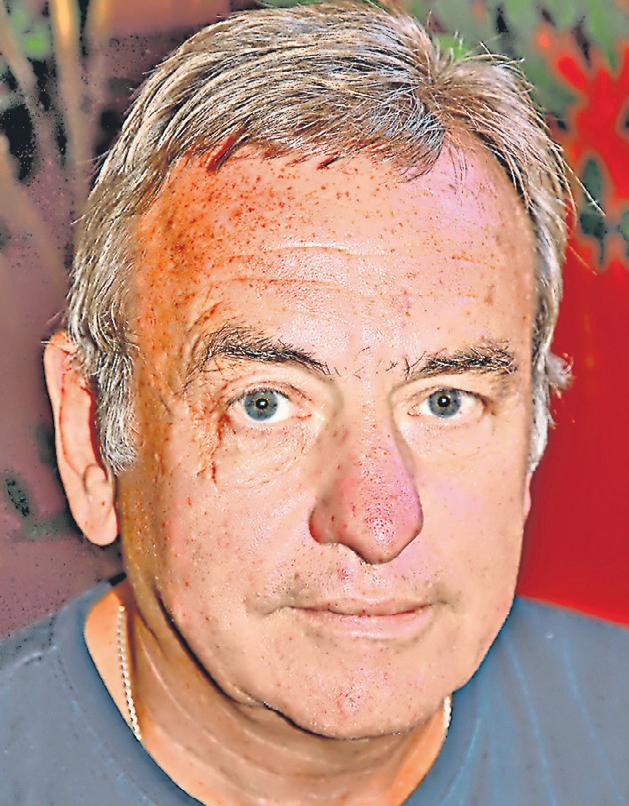
VOX POPULI, VOX DEI?
Dr Jay Kettle-Williams
‘The voice of the people is the voice of God’


GB News is a bit like Marmite, no? People either love the news channel or they can’t stand it. Personally it makes no difference to me whether people are for or against on this or on any other matter, as long as they remain reasoned, just, dignified and respectful in their persuasion. One of the channel’s presenters is the unashamedly Catholic and conservative



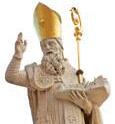











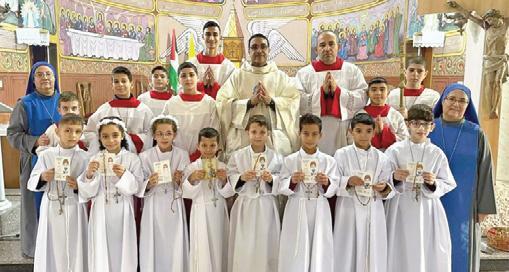







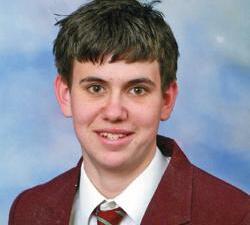

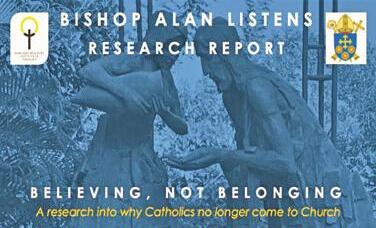


The Rt Hon Sir Jacob William ReesMogg (pictured), born 24 May 1969, member of the Conservative Party serving as the Member of Parliament (MP) for North East Somerset since 2010. He has adopted the expression Vox Populi, Vox Dei very much as a call sign or type of positioning statement.
That Latin phrase, meaning ‘The voice of the people is the voice of God’, relates to a Whig tract - a tract being a short article expounding a religious, moral or political opinion in an attempt to influence people's attitudes - of 1709, but which lost the entire pithiness it has in Latin when expanded in 1710 and in later reprints to The Judgment of whole Kingdoms and Nations: Concerning the Rights, Power, and Prerogative of Kings, and the Rights, Privileges, and Properties of the People.
It’s fascinating how in a pattern akin to Parkinson’s Law, the number of words we use expands with the opportunity, time and ability, we have at our disposal: the Lucan Text of the Lord's Prayer (Lk XI 2-4) contains 55 words, there are some 313 words (depending on the version) in The Ten Commandments (Exodus XX 2-17) but about 7,700 are used in Commission Regulation (EC) Number 557/2007 laying down detailed rules for implementing Council Regulation (EC) No 1028/2006 on marketing standards for eggs. I digress.

All I hear these days, when I listen for the voice of the people, are echoes of the tumultuous cry resonating down through the ages for the crucifixion of Jesus in return for the release of Barabbas. Barabbas had been a violent man, a brigand, a rebel, presumably a revolutionary, who had been jailed for sedition and murder, crimes which, under Roman law, were punishable by death. As a prisoner mentioned in all four Gospels, Barabbas was chosen by the baying crowd, over Jesus, to be released by Pontius Pilate in a customary pardon before the Jewish feast of Passover.
Historically, the release of Barabbas at the crowd's behest, and their subsequent demands to crucify Jesus, have been used to justify anti-Semitism.
Barabbas represents a faction, perhaps among many at the time and certainly very many since, set on challenging the society of which they might form part or otherwise wish to wage war against. But with war come casualties. 'The first casualty, when war comes, is truth', is the oft-quoted term coined during World War 1 by Hiram Johnson (1866-1945), a Progressive Republican senator in California. He died on 6 August 1945, the day the United
States dropped an atomic bomb on Hiroshima. Man's inhumanity to man,’ to quote Robert Burns, ‘makes countless thousands mourn!’ Not that such negativity necessarily makes me feel negative. But the optimism I normally feel is sorely put to the test by our human inhumanity working hand in glove with the ability to distort, misrepresent and condemn. Such, we know, can now be the Vox Populi whether that be at the micro or macro level, continuing in just the same way as has been the pattern in the past.
Well, folk might like to hear what people like us Catholics have to say. You never know, they might love it. Acknowledgements and
Texts/References adapted and/or adopted from http://en.wikipedia.org under the terms of the Creative Commons AttributionShareAlike License 4.0: http://creativecommons.org/licenses/by-sa/4.0/

Dr J L Kettle-Williams is an experienced business communications consultant and wordsmith (tutor, writer, translator).
Attribution:
For ALL of your Parishioners For some of your Parishioners Individual Subscriptions Online Subscriptions 100 copies: £15.00 per month* (15p per copy) 200 copies: £29.00 per month* (14.5p per copy) 300 copies: £41.00 per month* (14p per copy) 50 copies: £12.00 per month* (24p per copy) 10 copies: £9.00 per month* (90p per copy) 1 Copy delivered by Post: £4.00 per month* 1 Online Copy via Email £3.00 per month* Subscribe to www.CatholicPost.co.uk from Eight children from the parish of Gaza receive First Holy Communion about Promoting the Good in Young People A story of forgivenessDiocese publishes results of ‘Bishop Alan Listens’ research report you have been given the Catholic Post for free your parish, www.catholicpost.co.uk All prices include delivery *20% Discount for ALL ongoing subscriptions paid by card. For all your advertising requirements please contact Charlotte on 01440 730399 charlotter@cathcom.org Donate now at www.reachfoundationuk.org Your money goes a long way! Reach Foundation UK - charity no: 1171521 £1.80 provides a child with a meal every weekday for a month Page 10. The Catholic Post. June 2024.
Rayleigh priest receives Essex Police Volunteer awards
dioceseofbrentwood.net
“Fr Paul is an active member of the Catholic Police Guild supporting Catholics across the Force to come together in faith and practice their faith within policing.”
Congratulations to Fr Paul Fox, parish priest at Our Lady of Ransom, Rayleigh, who received two awards at the Essex Police Volunteer Awards recently. He achieved the first award for long service – 10 years as a police chaplain – and the second for all that he does for Rayleigh Police Station and the wider force.
Hannah Kelly, Lead Chaplain in the Diversity, Equality and Inclusion Team, says: “As a chaplain to Essex Police, Father Paul regularly attends his local station in Rayleigh, where over the years he has built up strong relationships with the staff and officers there. He is available to anyone who needs pastoral/spiritual care, which is invaluable to our colleagues who deal with some of the most traumatic incidents. Fr Paul was also recognised for the support offered to the wider force, especially when police had attended the tragic incident of the migrant deaths in a lorry in 2019.
“Fr Paul is an active member of the Catholic Police Guild supporting Catholics across the Force to come together in faith and practice their faith within policing. Thank you Fr Paul!”
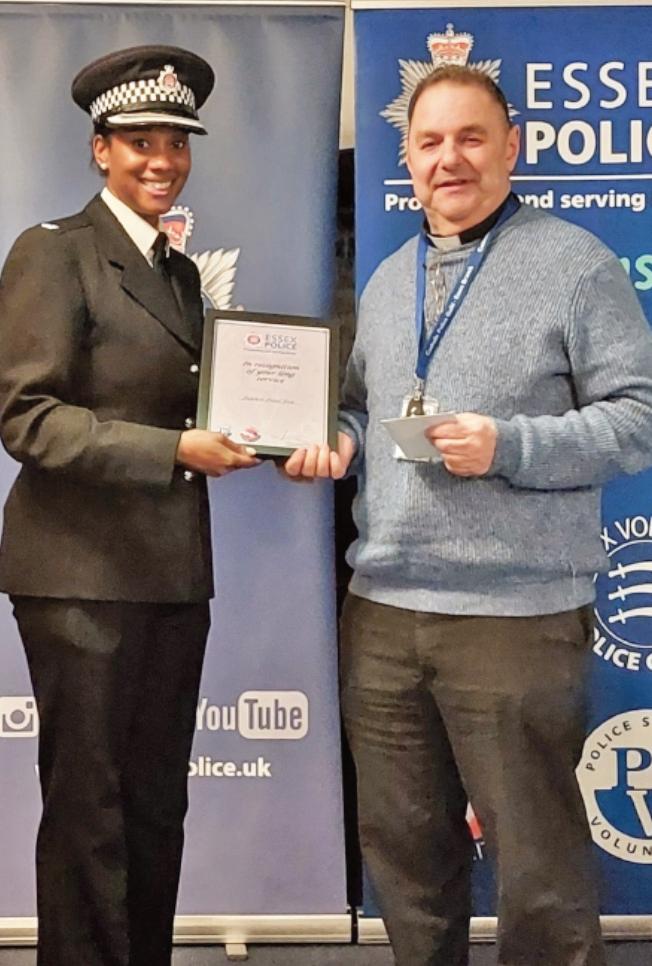
Frank Goulding
Back in 1961 I joined a political youth movement, I believe it was for the right reasons but that is for others to judge. In early 1962 the organisation produced a booklet on “Aid for underdeveloped countries” which examined the then problems of the British Commonwealth. The conclusion reached in the early sixties was that we should aim to increase our aid substantially. In 1970 the United Nations urged a figure of 0.7% was needed from our national funds for what amounted to “the song helping the weal.” In the 2 General Elections of 1974 this statistic was mentioned but only as a minor item. Many years passed before the 0.7% was reached and during recent years the figure was cut back to 0.5%.
Overseas Aid during any period of economic austerity is likely to get a similar low priority as it did in 1974. We will have a General Election later this year and it may take a brave politician to even raise this issue when we examine the many more demands on our economy. For the record back in 1962 we spent £13 per person on gambling compared with £5 in aid to underdeveloped countries.
I have been fortunate to be able to vote in every local and national election since 1966 but I fully understand that many young people do not join any political group and may well not even vote in a parliamentary process later this year. Father Ed O’Connell a priest since 1973 writing in “Far East” the magazine of the Columbian Missionaries speaks of “democracy in practice letting us down and of politicians

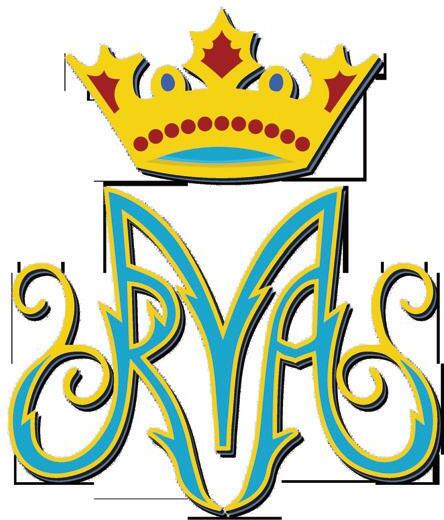

behaving more according to their own needs and interests also having lost contact with the sufferings of ordinary folk.” Father O’Connell has worked with marginalised children and women in Peru and is now based in Britain, he has taken an interest in politics and young people since the 1960s. I suspect many share his concerns.
As the activity and welfare of our young people have featured in this article I do welcome the possibility of new Catholic free schools from the Department for Education. I hope this does become a vote of confidence in Catholic Education particularly as the most needy of our children will benefit and who knows get involved in politics for the right reason.

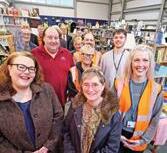
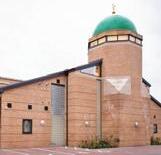

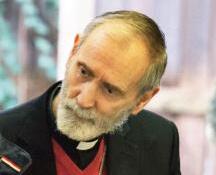
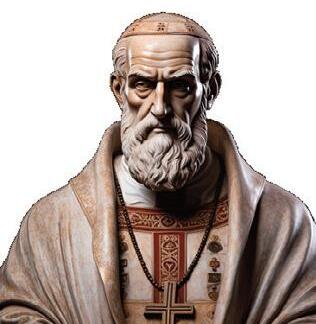


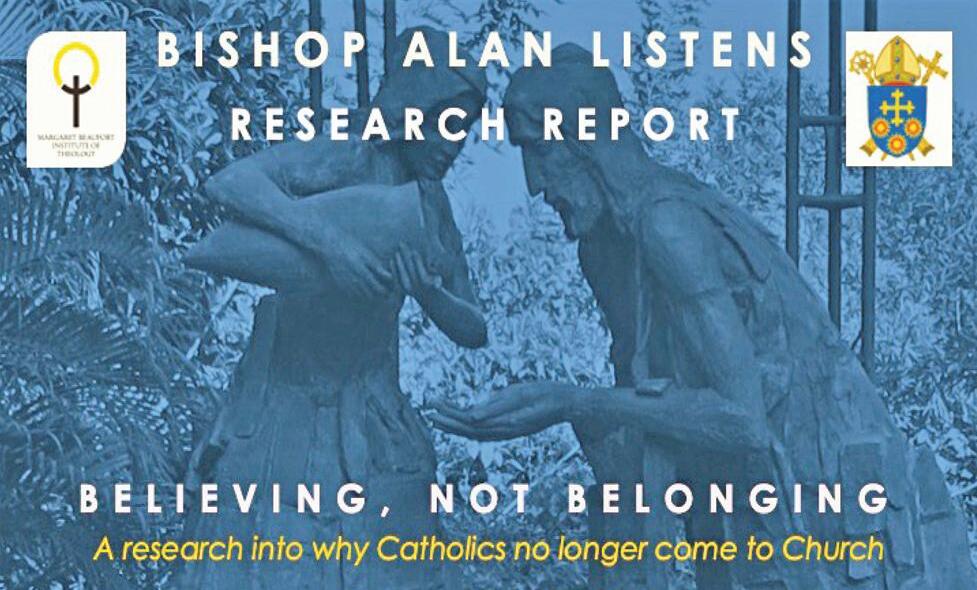




The Catholic Post. June 2024. Page 11.
Democracy in practice letting us down Please support our Advertisers For all your advertising requirements please contact Charlotte on 01440 730399 charlotter@cathcom.org Subscribe@catholicpost.co.uk 01440 730399 www.catholicpost.co.uk Monthly National Catholic Newspaper APriL 2024 The Nicene Creed top of the prayer pops page 12 Curry and More than 100 tonnes saved from going to page 9 A - A 2 Edition 28 Please donate £1 to support your parish See below for details page 15 www.CatholicPost.co.uk Diocese publishes results of ‘Bishop Alan Listens’ research report Last summer, Bishop Alan of the Diocese of Brentwood, partnership with the Margaret wanted to seriously listen to their stories and experiences to understand why so many Catholics no longer feel as though they belong Fr Liam Hayes, Director of The Centre for Institute, Cambridge, undertook the research on Bishop Alan’s behalf. He says: “Our research Catholics who no longer go to Church do not feel welcome, appreciated or even visible, for they experience Church in which they nolonger see their face, hear their voice or church’s ethical teachings and its wider praxis. “The Covid pandemic afforded many Catholics with faith and Church, and when Catholics feel judged, unwelcome, invisible and neglected, elsewhere in order to make sense of the griefs svp.org.uk If you have been given the Catholic Post for free in your parish, PLEASE would you be able to donate £1 to your parish for it, or even £10 per year! My faith has not waivered, my relationship with God will always be strong, but it is the judgement from the Diocese and the Church which needs to change to become more inclusive of everyone. Churches must open their doors to all, not just to those defined specifically as ‘practising’ Catholics.’ The UK’s first Carbon Neutral National Catholic Paper National and International News from a Catholic Perspective with thoughtful articles to deepen Faith OUR LADY QUEEN OF HEAVEN CATHOLIC PRIMARY SCHOOL Hare Lane, Langley Green, Crawley RH11 7PZ Headteacher Tobias Melia Telephone 01293 526057 Be er Never Stops!
On Europe Day COMECE and CEI call for a new European humanism
vaticannews.va
“You are a living body, so perhaps the time has come for new institutional reforms in order to allow you taking up today’s challenges.”
As the European Union marks its annual Europe Day on 9 May, the President of the Commission of the Bishops' Conferences of the European Union (COMECE) and the president of the Italian Episcopal Conference (CEI) Cardinal Matteo Zuppi urge the EU to rediscover its founding values of peace, unity and solidarity.
Europe Day commemorates the anniversary of the 1950 historic Schumann Declaration in which the then-French foreign minister proposed the creation of a European Coal and Steel Community (ECSC), the first in a series of post-war cooperative endeavours between nations which would eventually become what is now the European Union. The observance was established to raise awareness on the founding values of peace, freedom, solidarity and unity in diversity of the EU and to celebrate its achievements.
Those achievements and values are increasingly put into question today by resurgent nationalism and rising populism, amid growing disaffection with European institutions, and at a time of continuous crises on a continent which is experiencing a war in Ukraine, climate emergencies and a shifting of geopolitical plates.
Against this backdrop and in view of the upcoming European elections on 6-9 June, the open letter emphasizes the need for shared ideals to maintain Europe’s cohesion.
The five-page document begins by praising the EU’s efforts to build unity instead of perpetuating conflict, and emphasizes the importance of erasing barriers and working together. It acknowledges that, amidst criticisms, the EU has played a crucial role, which was particularly evident during the COVID-19 pandemic, when cooperation was essential.
A stronger Europe closer to citizens
At the same time, the Presidents of COMECE and and CEI express their desire for a stronger EU and for Europeans to feel a closer connection to it.
“We are writing to you as we have a desire in our heart: that what you represent and what
you are can be strengthened, that we all learn to feel you close to us, to feel you as a friend and not far nor unknown.”
The five-page document then delves into the historical context that brought about the creation of the European Economic Community (EEC) in 1957, highlighting the devastation caused by wars prior to the formation of the EU, and credits its visionary founders Robert Schuman, Konrad Adenauer, and Alcide De Gasperi, who, inspired by Christian faith, envisioned a Europe where nations could coexist peacefully.
“We cannot forget how, before you, we had been fighting for centuries endless wars whereby millions of people were killed.”
The text goes on to outline the evolution of the EU from its origins and mentions milestones like the fall of the Berlin Wall in 1989, and its enlargement in 2004, as well as significant reforms such as the Lisbon Treaty which entered into force in 2009.
Need
for institutional
reforms
However, Bishop Crociata and Cardinal Zuppi remark, as “a living body” that time has come for new institutional reforms in order to allow you taking up today’s challenges.
However, according to Bishop Crociata and Cardinal Zuppi the new challenges looming today, highlight the urgent need for institutional reforms in the EU.
“You are a living body, so perhaps the time has come for new institutional reforms in order to allow you taking up today’s challenges.”
Expressing strong concern for resurgence of conflict in the world, and in particular the war in Ukraine and the conflicts in the Middle East, they urge the EU to assert its role in global affairs, advocating for peace, diplomacy, and values-based policies, and warn against internal divisions that weaken the EU's international influence.
Europe's founding values
Recalling how the Christian faith has contributed significantly to shape the EU values, they further urge a renewed focus on human dignity, birth and family policies, and reiterate the importance of welcoming migrants and fighting injustice.
Also, referring to the emerging challenges of economic innovation, security, environmental sustainability, and misinformation, the letter calls for a renewed sense of citizenship and participation in shaping the EU's future.
Finally, in view of the upcoming European election, Bishop Crociata and Cardinal Zuppi encourage all European citizens to actively participate in the polls emphasizing the importance of civic engagement in shaping the EU's future direction.
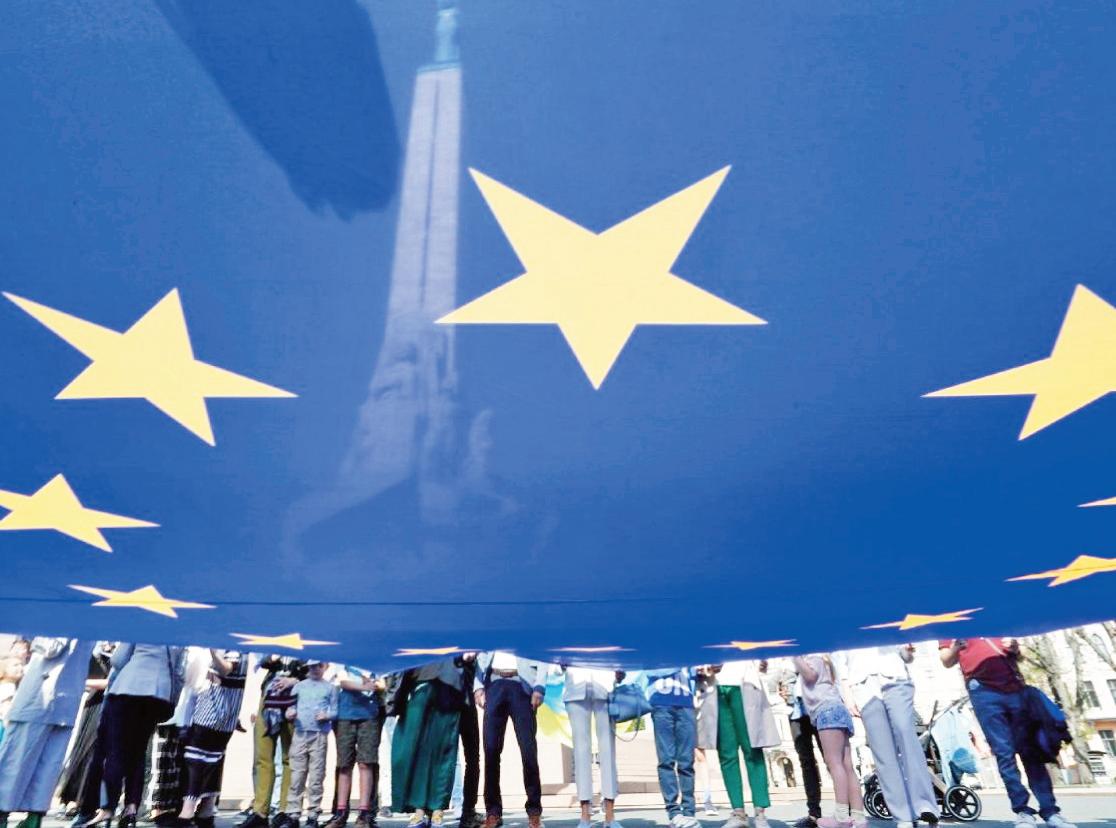
new European humanism
As a way forward, the letter concludes by proposing Pope Francis’ vision for a new European humanism, characterized by “humanization, courage, and a hopeful commitment to common ideals”, citing his words on the occasion his awarding of the International Charlemagne Prize on 6 May, 2016.
“With mind and heart, with hope and without vain nostalgia, like a son who rediscovers in Mother Europe his roots of life and faith, I dream of a new European humanism, one that involves ‘a constant work of humanization’ and calls for ‘memory, courage, [and] a sound and humane utopian vision'”
By Lisa Zengarini
Statement on government proposals to remove admissions cap for new academies
The Right Reverend Marcus Stock, Bishop of Leeds and Chairman of the Catholic Education Service (CES), has welcomed the decision by the Education Secretary, Gillian Keegan, to lift the cap on new free schools in England.
The decision paves the way for Catholic free schools to open, having previously been excluded under the 50 percent cap or ‘rule’ which would have forced schools to turn away some Catholic pupils.
Bishop Stock said:“These proposals are welcome. Dioceses are well placed to respond to differing local educational demands around the country, including the provision for children with special educational needs and disabilities. Parents can welcome this also.
“Catholic education not only provides a high performing school sector and promotes the formation of children in values and virtues;
it is more ethnically diverse than other schools, educates more pupils from the most deprived backgrounds, and builds social cohesion within our communities.”
The Department for Education also has plans to enable new faith-based academies for pupils with special educational needs and disabilities (SEND). The Catholic Church has a long history of SEND provision, and at present there are seven non-maintained Catholic SEND schools, three other independent Catholic SEND schools, and 16 other Catholic independent schools which are approved for SEND provision.
Consultation
The decision is subject to a seven-week public consultation that closes on 20 June – take part in the consultation by using the QR code below.

Page 12. The Catholic Post. June 2024.
A
catholiceducation.org.uk
on e
Laity In Search of Fraternity?
Fr Jonathan Cotton.
Brother Charles warned us against becoming “mute dogs or sleeping sentinels”.
Myself and Deacon Owen le Blanc, have been members of Jesus Caritas Fraternities for many years, regularly attending monthly meetings with local clergy. These are based on the spirituality of St Charles de Faucauld, a hermit monk who lived and died among the Twareg Tribe of Muslims in Algeria at the beginning of the 20th Century. His spirituality is one of presence rather than preaching, fascinated by and wanting to learn from the hidden life of Jesus in Nazareth, and aiming to be a universal brother or sister with those on the margins of society, especially from other cultures and faith’s than our own. Recently, wanting to see Fraternities grow in the Diocese, we have been arranging a Day of Recollection for the Clergy on the Spirituality of St Charles de Faucauld on Wednesday 5th June in the Hall of St Joseph’s Church Matlock – open to any clergy in the Diocese and beyond.
But, it occurred to me that perhaps lay people in the Diocese might be interested in being part of a small, local fraternity based on the spirituality of St Charles de Foucauld, or “Brother Charles”, as he preferred to be called. Currently, there are ten lay fraternity groups in
England with a total of just over 100 members. They are based mainly in the London area, but also in Liverpool and the West Country. They are part of a world-wide family of fraternals. But we would love to see a few lay fraternals in our Diocese.
We cannot be Christians on our own. We need each other. And these fraternals are one way to meet this need. These different fraternities for clergy and lay people follow a similar pattern when they meet, although each fraternity decides for itself how they prefer to meet. They aim to be sisters & brothers to each other so that they can be better sisters & brothers to the people among whom they live. They meet to pray, especially eucharistic prayer [adoration &/or Mass], to reflect on the Gospel & encourage one another in the living out of the Gospel, and enjoy each others company by sharing some food together.
Recently, the lay fraternities have been considering how they can respond to various “turning points” they have discerned in England and around the world – for example: with regards to ecology & climate change; with regards the Church after sex abuse scandals & the adoption of the synodal way of discernment; with regards to the migration issue; with regards to conflicts & wars; with regards to housing problems; with regards to listening & dialogue rather than confrontation; with regards to profit & consumerism.
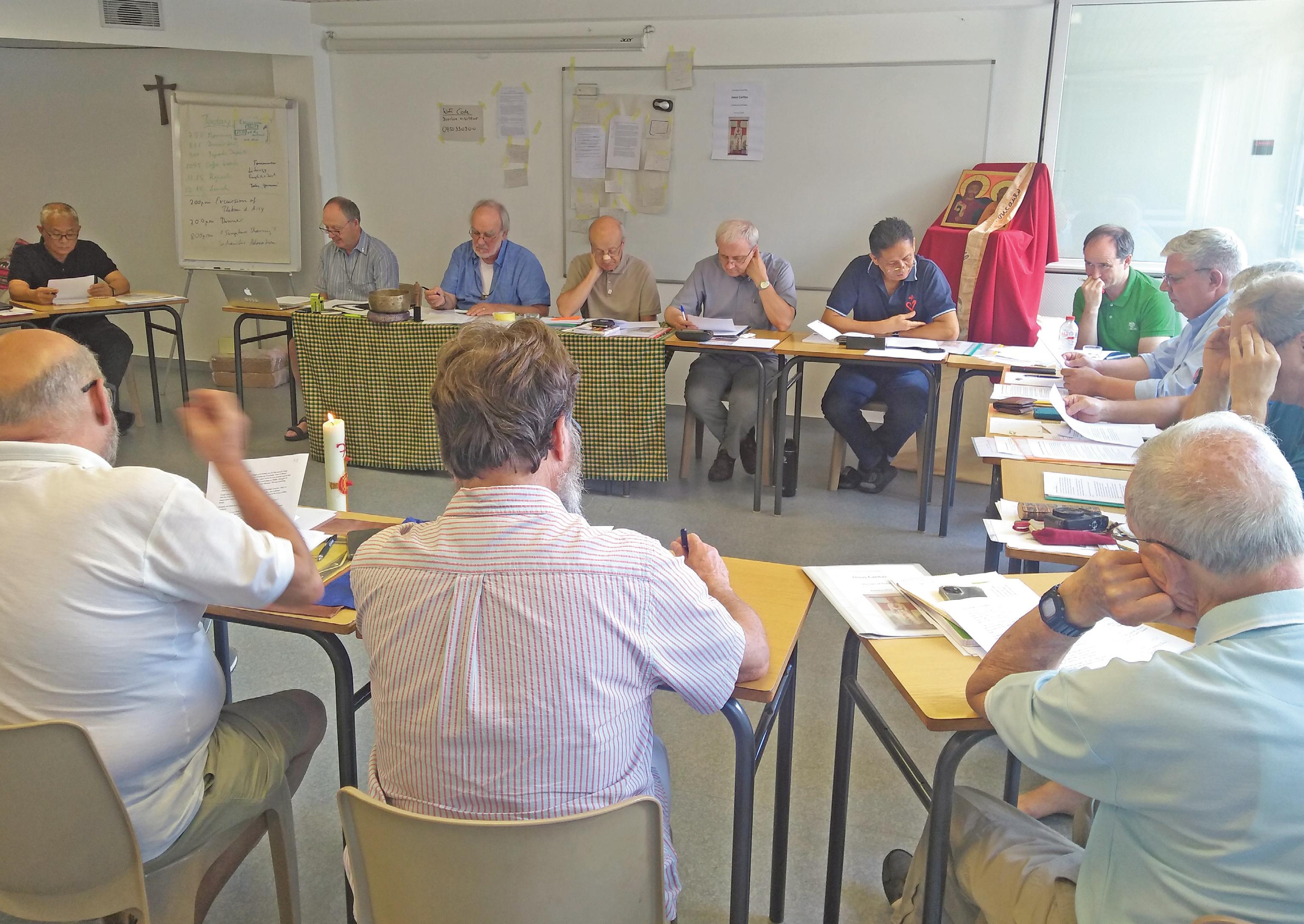
Brother Charles warned us against becoming “mute dogs or sleeping sentinels”. And also wrote: “I do not believe one should talk a lot or write a lot, but one needs to improve oneself and improve the lives of people around us; but doing so as a friend, softly…above all one should act with perseverance without despair”.
If you would like to know more, Moira Potier is the UK Representative for the lay fraternals: moira.cdf@gmail.com. Deacon Owen and myself can be contacted on: owen.leblanc@dioceseofnottingham.uk; jonathan.cotton@dioceseofnottingham.uk
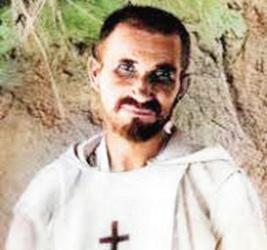
95% of Brits don’t identify the “world’s largest” humanitarian crisis, new poll reveals
Every life counts equally, whether in Ukraine, in
Gaza, or in Sudan
A new poll published recently by CAFOD, conducted by YouGov, has found that only 5% (one in twenty) of British adults think that Sudan is currently experiencing the world’s largest humanitarian crisis. This is despite more than 25 million people – half the country’s population – needing urgent emergency assistance, surpassing figures from Gaza, Ukraine, and Syria.
CAFOD, the Catholic development agency, is drawing attention to the situation in Sudan, which has deteriorated rapidly since conflict broke out in April 2023, with over 8.5 million people now displaced from their homes.
The poll also revealed that eight times more people (42%) thought Gaza was the world’s
largest crisis than identified Sudan (5%), and nearly five times as many people (23%) chose Ukraine over Sudan. Yet Sudan has been described by the UK Ambassador to the United Nations as being “the world’s worst hunger and displacement crisis.”
Failed harvests and the ongoing conflict mean that up to 8 million people – almost the population of London – could face famine-like conditions by June. However, over threequarters of the British public (77%) were not aware that the United Nations has warned of a potential famine in Sudan.
Telley Sadia, CAFOD’s Country Representative for Sudan, commented: “Whilst the situation continues to be horrendous for civilians caught up in conflicts in Gaza, Ukraine, and elsewhere, these figures demonstrate how the world’s attention being so firmly fixed on some global crises means the scale of the disaster affecting Sudan is largely unknown.
“Right now, fears of famine loom ominously across the country. Children are already
succumbing to starvation as food prices continue to skyrocket and urgent food aid remains out of reach for millions of people.
“As Sudan teeters on the edge of one of the biggest, yet avoidable, humanitarian crises in living memory, it is imperative that the global community unite to provide assistance and support to those in need.”
Speaking at a UN Security Council meeting on Sudan on 19 April, the UK Ambassador to the United Nations, Barbara Woodward, also said: “Civilians are being murdered, women and girls are being raped. Villages are being looted and burned to the ground.”
At a recent funding conference for Sudan held on 15 April in Paris, only half of the $4 billion needed was promised by richer countries. Annalena Baerbock, the German foreign minister, highlighted the severity of the crisis, stating: “What we are witnessing in Sudan is the worst child displacement crisis in the
world.” And yet, she said, “in many of our countries, as the war enters in its second year, it is practically absent from our daily news. Every life counts equally, whether in Ukraine, in Gaza, or in Sudan.”
In response to these alarming developments, CAFOD is calling for immediate action from the UK and leading governments from the global north. Specifically, CAFOD urges:
n Support for an emergency appeal to help families caught up in this crisis.
n Stepped-up calls for an immediate ceasefire, civilian protection, and unimpeded humanitarian access.
n Increased funding pledges to meet the $2 billion shortfall required for Sudan’s relief efforts, as identified by the UN, to avert this crisis turning into a catastrophic tragedy.
For more information visit cafod.org.uk/SudanAppeal
The Catholic Post. June 2024. Page 13.
CAFOD
Clergy Delegates at European Conference
St Charles de Faucauld
Book Reviews
Stations of the Cross: With St Alphonsus Liguori
Fr Jim McManus CssR, St Alphonsus Liguori
£3.95
CTS Product Code: D799
Please refer to this code when ordering over the phone ISBN: 9781784690724 www.ctsbooks.org
Classic devotions enriched by additional prayers, a brief biography and a reflection on the Way of the Cross as a Way of Divine Mercy. Elegantly edited by Fr Jim McManus.
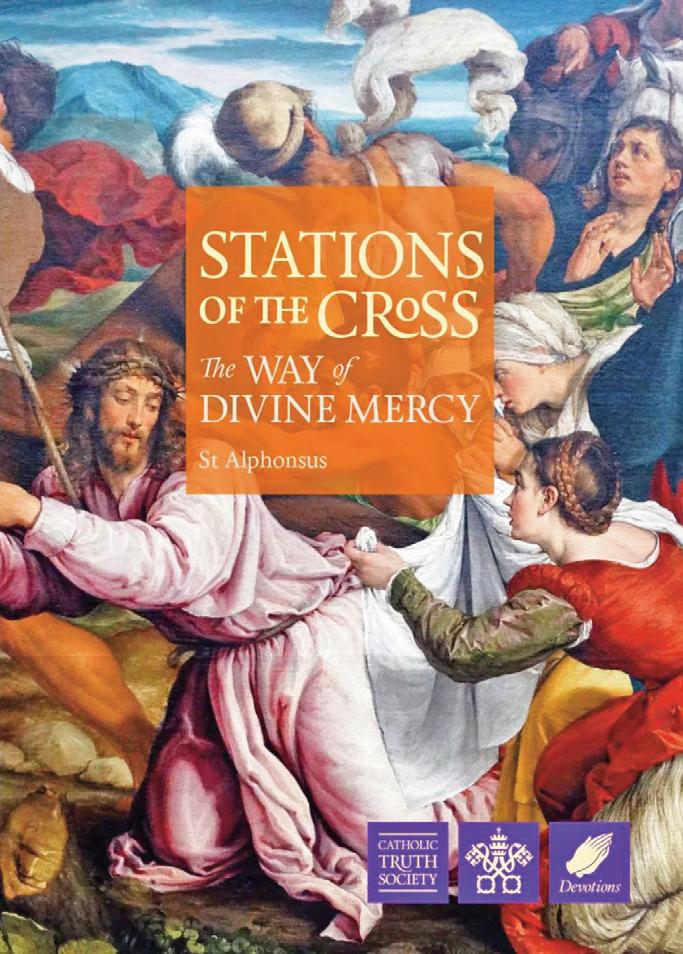
These classic reflections on Christ’s passion by St Alphonsus retain their timeless relevance. They are enriched by a brief biography of Alphonsus, a selection of prayers penned by him, and a word on the history and value of the Way of the Cross as a ‘way of divine mercy’. This edition contains new colour illustrations to assist prayerful devotion.
Living Your Vocation
(Even If You Don’t Know What It Is Yet)
Fr Nicholas Crowe, OP
£3.95
CTS Product Code: PA68
Please refer to this code when ordering over the phone ISBN: 9781784697662 www.ctsbooks.org
What does God want you to do with your life? How do you know? Fr Nicholas explains how everyone can live a life that is holy and pleasing to God, even if you don’t know what God wants you to do.
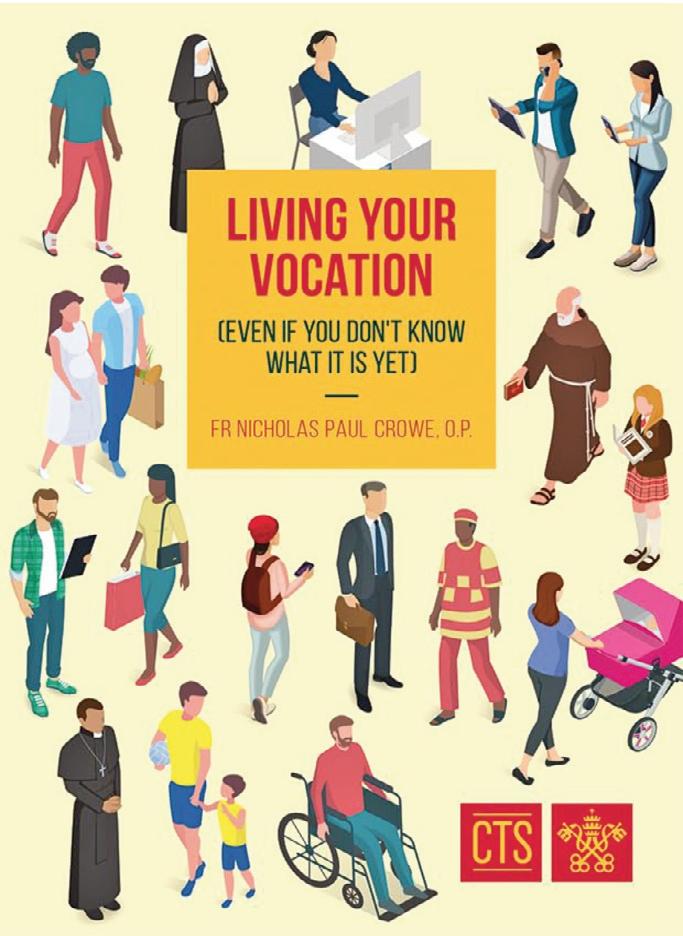
One of the biggest questions Christians ask is what vocation God has given to them. Marriage, priesthood, consecrated life, something else? What does God want you to do with your life? How do you know? How do you find out? What if you’ve already got it all wrong?
Dignitas Infinita
Dicastery for the Doctrine of the Faith
£4.95
CTS Product Code: DO974
Please refer to this code when ordering over the phone
ISBN: 9781784698171 www.ctsbooks.org
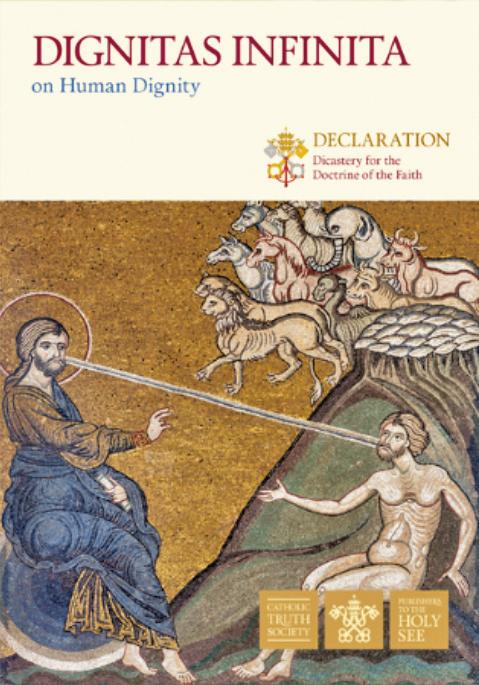
The Dicastery for the Doctrine of the Faith reiterates and strengthens the Church’s perennial teaching on the universal and infinite dignity of every human person, emphasising its origin in God, the loving creator who formed us in His own image.
In this declaration, the Dicastery for the Doctrine of the Faith reiterates and strengthens the Church’s perennial teaching on the universal and infinite dignity of every human person, emphasising its origin in God, the loving creator who formed us in His own image. In light of this, the DDF condemns the grave violations of human dignity that arise in today’s world from a number of contemporary evils including: violence against women, abortion, surrogacy, euthanasia, gender theory, sex change operations, and digital violence.
Deliver Us From Evil
Bishops' Conference of England and Wales
£9.95
CTS Product Code: DO968
Please refer to this code when ordering over the phone ISBN: 9781784697693 www.ctsbooks.org
This attractive volume is a treasury of prayers and supplications from Holy Scripture and Sacred Tradition that can be used by the faithful in spiritual warfare against the powers of darkness, in any time of fear, distress or temptation.

This attractive volume is a treasury of prayers and supplications from Holy Scripture and Sacred Tradition that can be used by the faithful in spiritual warfare against the powers of darkness, in any time of fear, distress or temptation.
The Road to Emmaus and Beyond
Fr Denis McBride
£9.95
Product Code: 1815
ISBN NO:9780852315248 www.rpbooks.co.uk
A revised, special edition of Emmaus –the gracious visit of God. A best-selling classic which has had 4 reprints, and was originally published by Dominican Publications.
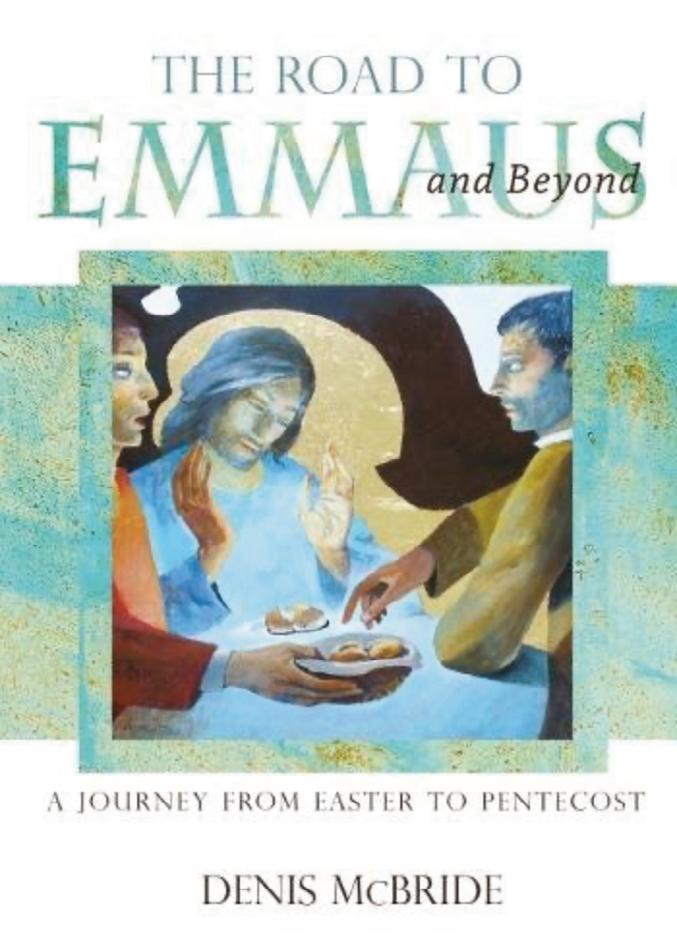
Following the death of Jesus in Jerusalem, two disappointed disciples leave the city of lost hopes and head away. They meet a mysterious stranger who helps them reinterpret the past in a new light, giving them fresh hope. For many people, the story of Emmaus is the most moving of the resurrection narratives, and Denis McBride’s reflections uncover the depth and beauty of Luke’s unique scene. The story gives Christians a perfect reminder of coming to know Jesus as Lord in the Eucharist.
Stations of the Resurrection
Richard Q Greatrex
£12.95
Product Code: 1841
ISBN NO:9780852315453 www.rpbooks.co.uk

tandem to lead us through the neglected cycle of the Church’s year, from Easter to Pentecost. After the pilgrimage of Lent, many people might feel exhausted at the prospect of starting another one so soon. With Richard as our guide, however, this Easter pilgrimage is a very gradual and gentle journey; the pace is as leisurely as the insight is rewarding; it is an excursion of heart and mind that will surely deepen our faith in the risen Lord.”
Denis McBride C.Ss.R. (from foreword)
Birthing The Holy: Wisdom from Mary
Christine Valters Paintner
£15.50
Product Code: 11749
ISBN NO:9781932057270 www.rpbooks.co.uk
Christine Valters Paintner invites you to better know Mary and her heart through thirty-one of her titles, and, along the way, you’ll nurture the new growth in your life.
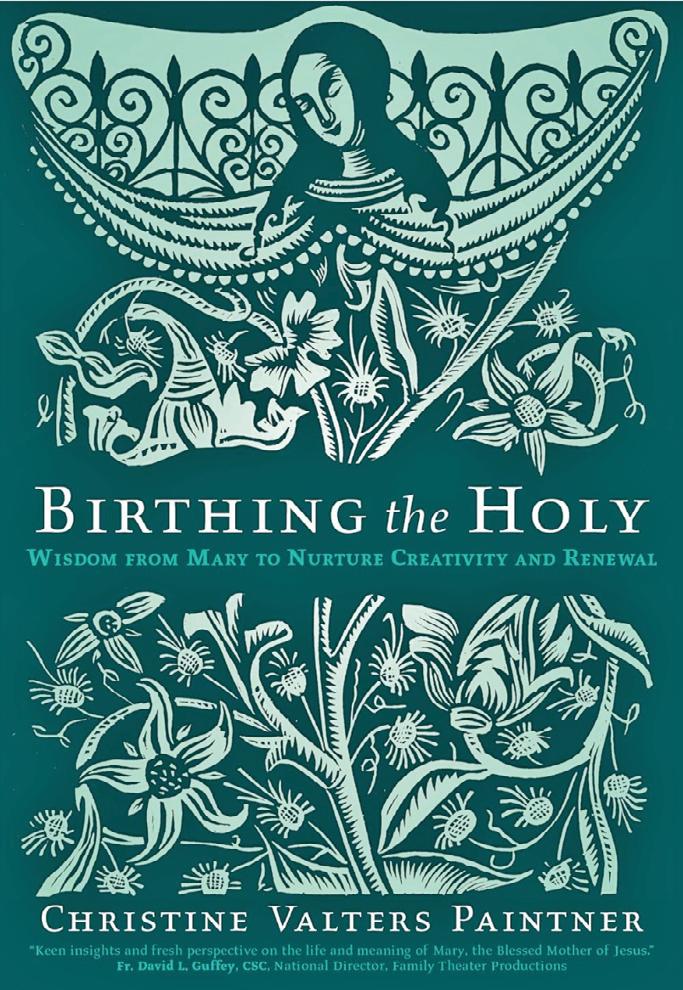
The Blessed Mother is known by many beautiful titles, some of which are familiar—Virgin, Queen of Peace, and Star of the Sea—and some we may not be aware of— Vessel of Grace, Greenest Branch, and Our Lady of Silence.
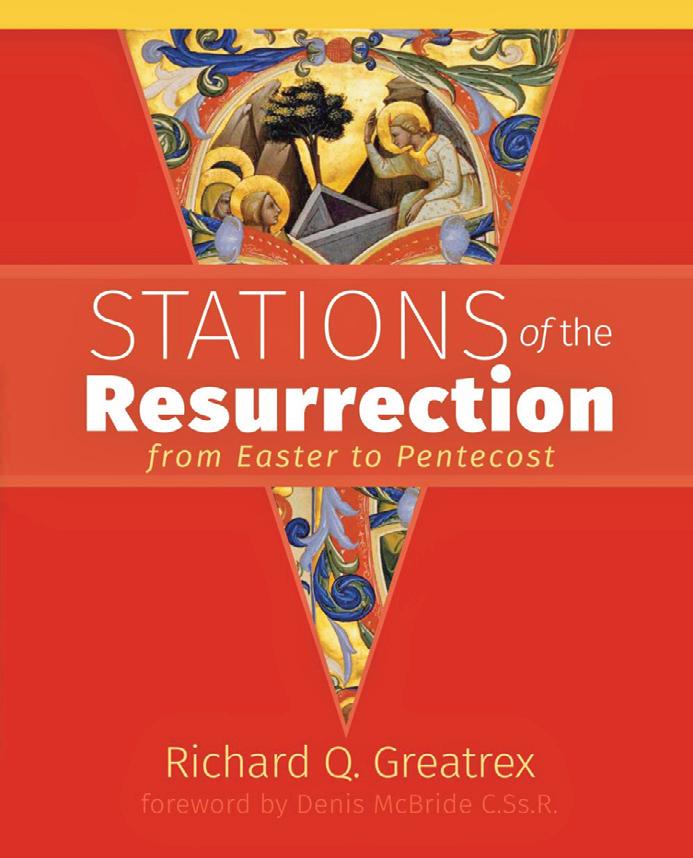
Using readings, reflections, art and prayers in conjunction with suggested hymns and ideas for producing your own stations, Stations of the Resurrection offers a rich resource intended to refocus both congregations and individuals on the transformative joy, hope, grace and challenge of Eastertide.
“Richard’s writing and the images he has chosen to accompany each station work in
Paintner offers a flexible format to reflect on Mary’s titles through a thirty-one-day personal retreat, a series of novenas, or with visio divina exercises using striking images by printmaker Kreg Yingst. As you reflect on Mary in her role as Mother of Good Counsel, Woman Clothed with the Sun, Mystical Rose, Mother of Sorrows, Queen of the Angels, and other titles, Paintner invites you to hear what God calls you to develop in your life, help that dream or vision grow, and then nourish it in the world.
Whether you’re meeting Mary for the first time in these magnificent titles or revisiting her as a beloved companion, Birthing the Holy invites you to see the exploration of Mary and your life as a spiritual and creative act, one that can help deepen your faith even as it sparks new growth within you.

Page 14. The Catholic Post. June 2024.
For all your advertising requirements please contact Charlotte on 01440 730399 charlotter@cathcom.org
On the second anniversary of her killing, Pax Christi International remembers Shireen Abu Akleh
“I chose journalism to be close to the people. It might not be easy to change the reality, but at least I could bring their voice to the world.”
Shireen Abu Akleh, a Palestinian Christian, was born into a Melkite Catholic family in Jerusalem. As a Palestinian-American journalist, she worked for the Al Jazeera news network and was known throughout the Arab World for her 25 years of reporting on the Israeli-Palestinian conflict.
Early on May 11th, 2022, Shireen was targeted and killed, by an Israeli military sniper, while she and her team were reporting on an attack on Jenin Refugee Camp.
Many of us in Pax Christi followed her reports because, for over 20 years, we have known her family in Bethlehem, staff of the Arab Educational Institute, a Pax Christi International Partner.
Her death was shocking but almost more so were the appallingly violent scenes at her funeral, when Israeli forces attacked the coffin bearers, family and other members as they emerged from the hospital in Jerusalem where she had been at rest. Church Leaders in Jerusalem and the World Council of Churches strongly condemned her killing and the violence at her funeral.
In February 2023, our Pax Christi International Delegation met with Shireen’s brother, Tony, and more of her family. They shared with us the heartbreaking story of their year of international efforts to gain justice for Shireen and for her killer to be held to account.
The pain on their faces and in their voices told of the intransigence of the politicians, who despite the evidence that has been openly reported, are unwilling to support their appeals for justice and accountability.
A year on and still there is no justice for Shireen and more Palestinian Journalists have
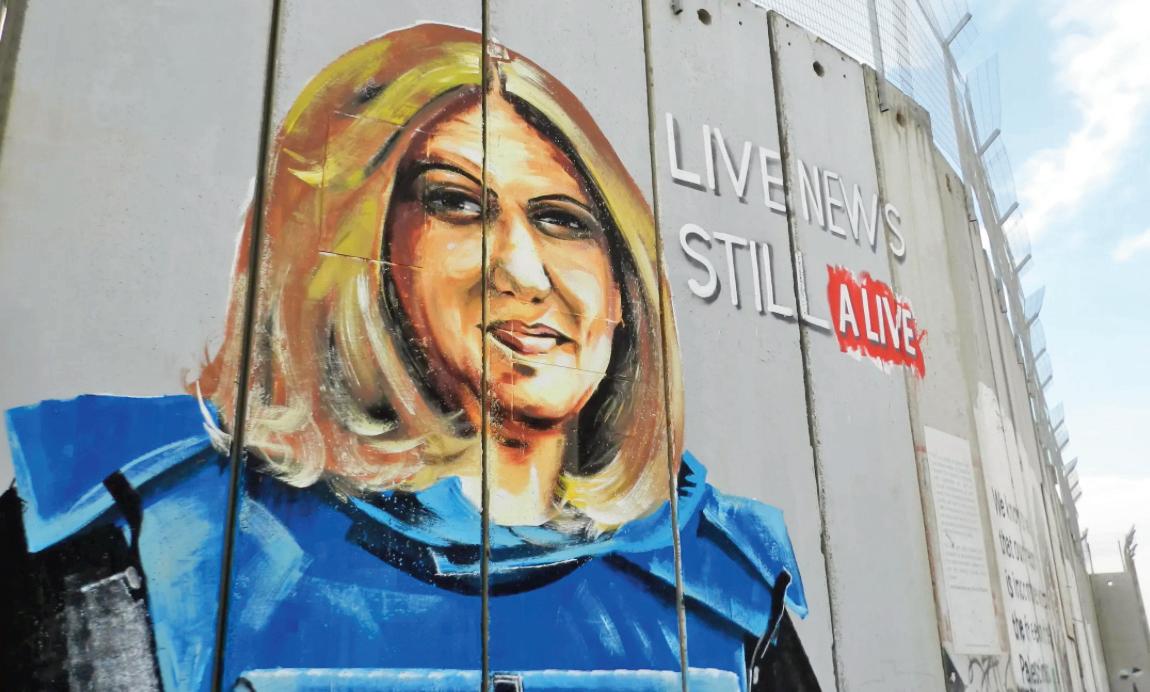
been deliberately targeted and killed as they report on the Israeli genocide and ethnic cleaning in Gaza and the West Bank. Shireen is one of more than 100 Journalists killed by Israel since 2000. (Source: cpj.org)
A few months before her death, Shireen said, “I chose journalism to be close to the people. It might not be easy to change the reality, but at least I could bring their voice to the world.”
On this second anniversary of Shireen’s death please continue her work of bringing to others the voices of the silenced, the oppressed and occupied.
n Pray for her family; for accountability and justice for the families of all Palestinian journalists killed;
n Share her picture with others and carry it with you if you are on a Ceasefire March on Saturday;
n Write to your elected representatives and ask for accountability and justice for Shireen and her family.
Written by Ann Farr, Pax Christi England and Wales Chair

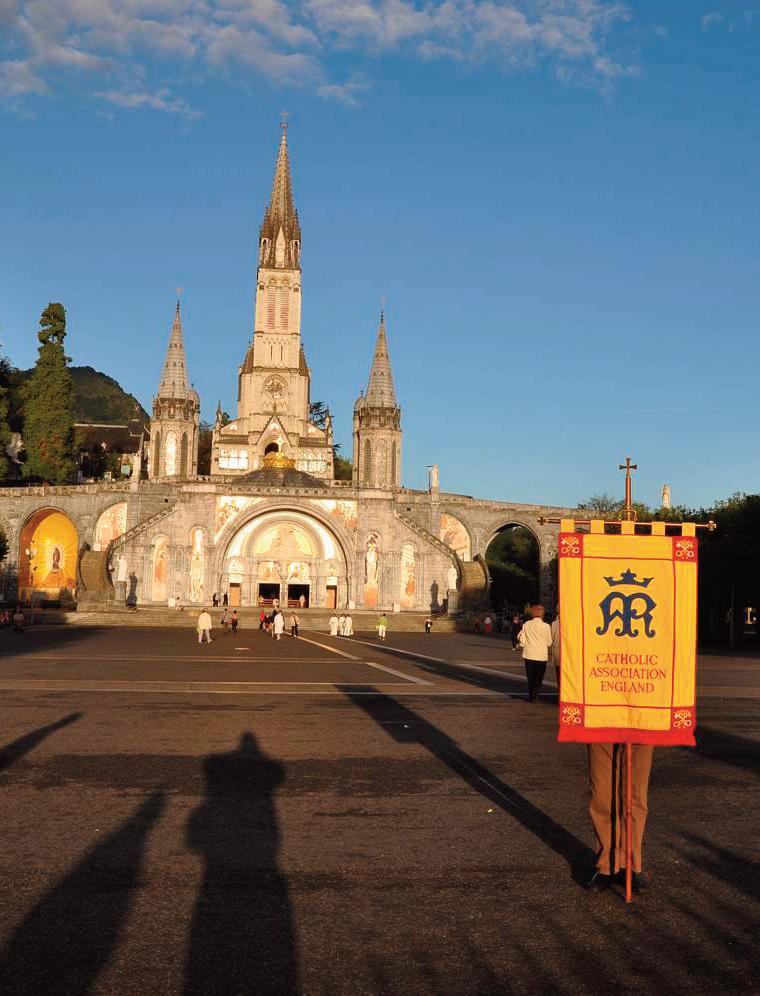
The Catholic Post. June 2024. Page 15. CATHOLIC ASSOCIATION LOURDES PILGRIMAGE 23
30 August 2024 The
new
new
you have the goodness to come here.” - Our
For
Catho ic Herakd indd 1 19/04/2024 13:43 42
-
Catholic Associa琀on (founded in 1891) is returning to Lourdes again this year: Friday 23rd to Friday 30th August 2024 We need helpers (medical and non-medical), assisted pilgrims (sick or with a disability), friends and families:
and experienced. All are welcome regardless of your loca琀on. Come and join
and old friends (plus our banner) this August! “Would
Lady of Lourdes to Saint Bernade琀e
more informa琀on, please contact: chiefs@catholicassocia琀on.co.uk / call: 01732 886666, or visit the CA website: www.catholicassocia琀on.co.uk.
paxchristi.net
our Advertisers
Please support
Tips For Good Communication for the Deaf
Deaf Awareness Week (6-12 May) provided an important opportunity to raise awareness of the challenges faced by people who are Deaf or who have hearing loss, helping to make everyday life more deaf-friendly.
According to the Royal National Institute for Deaf People, 12 million adults in the UK are deaf or have hearing loss.
The Diocese of Arundel & Brighton is enriched by the contribution that the Deaf and Hard of Hearing community bring to the work and mission of the Church across our parish communities, enabling people throughout our family of faith to have equal access to and inclusion in, the celebration of Mass and the sacraments using BSL (British Sign Language), in a style appropriate to their needs (BSL is a language in its own right and is formally recognised by the British Government).
Pastoral Coordinators for the diocesan Deaf Service, Maria and Peter Booker, were awarded the St Philip Howard medal in 2023, for their service to the Deaf community and the Diocese. The Service is also supported by two priests, Fr Ian Byrnes, Deaf Service Director and Chaplain, and Fr Raglan Hay-Will, Assistant Chaplain, with members of the Deaf
community meeting to celebrate Mass in BSL at 1pm on the first Saturday of each month, at St John the Evangelist Catholic Church in Horsham. Members of the Deaf community also join our annual diocesan pilgrimage to Lourdes and other Diocesan events.
Maria offers these tips for good communication with people who are deaf or have hearing loss:
Do
- attract the Deaf or Hard of Hearing person’s attention before you start speaking to them;
- be brief, keep still, at an easy distance for lipreading;
- face the person while you are speaking, making sure there is enough light on your face;
- speak one at a time and clearly, with the natural rhythms of speech;
- minimise background noise;
- raise your voice if the lipreader asks – but don't shout;
- use "everyday" language in whole sentences and natural body language, and give clues about the context of your conversation;
- stick to one point at a time and be ready to take your time;
- use gestures to help explain what you are saying and facial expression to help convey
C R O S S W O R D


the meaning;
- fingerspell the name or word, if you are able to;
- persevere: repeat what you said, try to say it another way;
- write down the message (only at a last resort);
- check with the Deaf person if communication is ok.
Don’t…
- be embarrassed;
- shout – it distorts your face and makes it harder to understand you;
- cover your mouth or obstruct it with a pen, look down or away or lean too close;
- place yourself too far away;
- eat or smoke while talking;
- mutter, hurry or talk too fast;
- change the subject without warning.
… And don’t ever say, “never mind, it’s not important” or ever give up!

 by Axe
by Axe

You can use both sets of clues to solve the puzzle: the solutions are the same.
CRYPTIC Across
7 Landmass of alkali – silicon, iron, aluminium, primarily (4)
8 7 city Paul sought, but could not see? (8)
9 Brigand hierarchy's share supplies a 7 political leader... (6)
10 ...toplaceAmericansailorswestofSaul'splacein7(6)
11 Guy retired following return of writer's block (7)
13 Tree tissue needs unspecified quantities of citrus fruit, mostly (5)
15 Titus helped make Church here tangible without deception (5)
17 Rebel top guns pulled out of housing project being built in 7 town (7)
21 Apostle has cheek to back a Greek character (6)
23 Italian town – East-South-East following French department's lead? (6)
24 Praise for Capri's evacuation of American leader to Rome (8)
25 Ancient 7 country's secure wall: extra dam's eventually built (4)
CRYPTIC Down
1 Father's vessel's first-class, about to go north to fish (8)
2 In need of cash for Oliver Trophy after Yacht Club p ulled out (4,2)
3 Recommendation to expose weakness after promotion (6)
4 Rug's edging looks top-notch – it's an enduring fiddle (5)
5 One in flight seen above quarry's very large (6)
6 African stays after little Benjamin somehow gets free from Zebulun (4)
12 7's British administration conflict is overturned (3)
14 Record a fellow and a Welsh girl being recipient of a letter from Paul (8)
16 Jewish commentary on the Torah, and thanks over Left's abuse being put down (6)
18 The King's hard to follow, like Tolkien's take on some in Middle Earth (6)
19 Setback: part of a clear single-mindedness of this 7 country? (6)
20 One of Joktan's boys at work: say hello, Rex (5)
22 Sacred-soundingfestivalin7(4) QUICK Across
7 Roman province of western Turkey, and home to 14 for instance (4)
8 Syrian home to Aramaeans who fought and lost to David (8)
9 Mohandas Karamchand -----, leader whose nickname meant 'Great Soul' (6)
10 One-time home in 7 for NT correspondent? (6)
11 Assembly of church canons (7)
13 Woody tissue (5)
15 One-time island home of the Philistines (5)
17 First city taken by the Israelites when they entered the Promised Land (7) 21 Son of Herod the Great –the first husband of Herodias (6)
23 City of Lombardy set between Lakes Maggiore and Como (6)
24 Emperor, 41-54 AD, who forced all Jews to leave Rome (8)
25 OT country east of Babylonia, capital Susa (4) QUICK Down
1 One of the Twelve Tribes (8)
2 Penurious; impecunious (4,2)

3 Counsel;warning(6)
4 Cremona violin-maker and music teacher to Stradivarius (5)
5 Marine bird of prey: rugby player from a merged Welsh regional team (6)
6 Part of the Nguni group of languages along with Swazi and Xhosa (4)
12 British rule in colonial India (3)
14 One in receipt of a letter from Paul, written about 62 AD while in prison in Rome (8) 16 Some Jews' interpretation of the Torah (6)
18 Puckish, imp-like (alternative spelling) (6)
19 David, 'the sweet psalmist of ------' (6)
20 Descendant of Shem, one of Joktan's sons (5)
22 BoisterousandcolourfulHindufestival(4)
Page 16. The Catholic Post. June 2024.
Across: 7 Asia, 8 Damascus, 9 Gandhi, 10 Tarsus, 11 Chapter,
13 Xylem, 15 Crete, 17 Jericho, 21 Philip, 23 Varese, 24 Claudius,
25 Elam. Down: 1 Issachar, 2 Hard up, 3 Advice, 4 Amati,
5 Osprey, 6 Zulu, 12 Raj, 14 Ephesian, 16 Talmud, 18 Elvish,
SOLUTION
19 Israel, 20 Ophir, 22 Holi.
Maria Booker of the diocesan Deaf Service signs “Welcome”
abdiocese.org.uk







































































































 by Axe
by Axe

